#dunmeshi analysis
Text

I've seen pieces from this extra comic before, but never read the full thing until today. And holy shit does it hammer home just how much the story is about class.
Multiple times, when food comes up in this comic, it’s also in context of money:
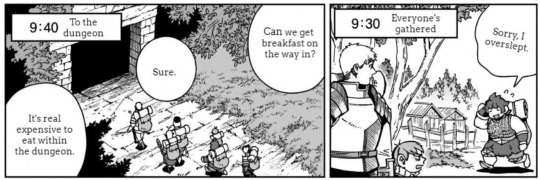
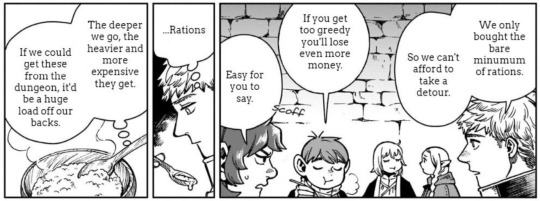
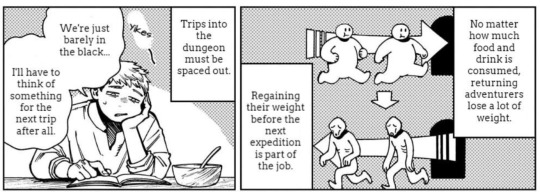
I've seen this last panel on the right brought up before in context of like, dungeon meshi's relationship with fat and eating, but in the full context of the comic it really hits how much adventuring directly consumes bodies for money.
As much as this has been part of the story the whole time, showcased as early chapters 19 and 20...
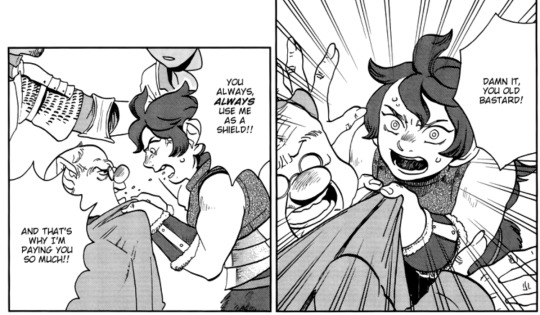
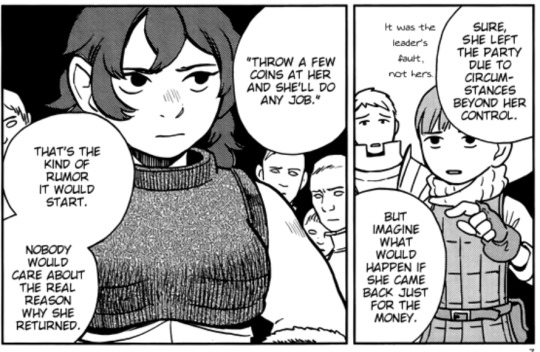
It never fully hit me before how often adventuring comes down to having no other way to make money but to throw yourself into death repeatedly. To be used, whether it’s by individual selfish people (like the resurrection group that is happy to try and get Kabru's group to kill each other to get extra gold from them in chapter 32), or by the greater cog of the Dungeon Economy in general.
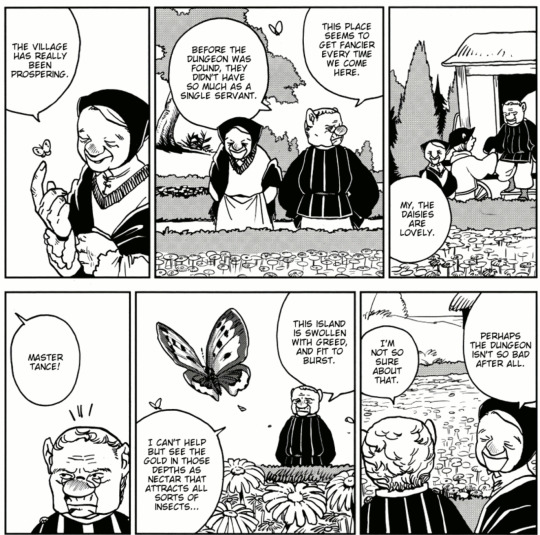
Which, to be clear, is all too often how things work in the real world, too. So many jobs burn through the health and lives of workers. Dungeon Meshi just makes it literal in a new way: by making the healing and resurrection, a core part to the adventuring loop, directly use fat, muscle, and energy from the body being healed.
Imagine Amazon, but if you got injured at work, they could literally burn up some of your body to get you back to working sooner. And that was seen as an advantage of the job.
And then you have Laios, thinking about eating monsters:
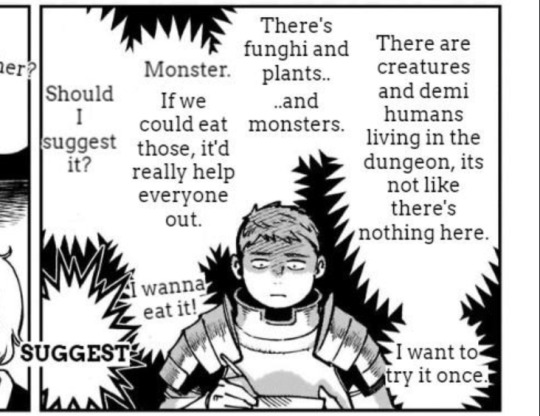
Not just because he likes monsters a lot. But because it would help. He says something similar in the actual manga too, during the chapter discussing his dream with the Winged Lion
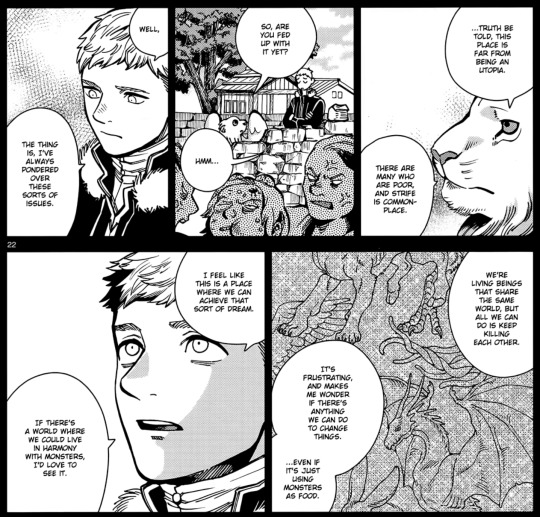
Laios wants to be able to make a home for Falin. He wants to give her a place where she never has to eat alone. And when he gets a party, he wants to give them a way to eat well. And when he runs a country, well…
He wants to ensure that everyone has enough to eat.
Food is political. Food ties into class, and money. What is deemed "proper" to eat, what is a luxury, what is crass… so much of it comes down to money.
Being judged for eating what's available, when what is “proper” isn't affordable, is already a thing that happens. People forced into work that consumes their energy is already a thing that happens.
Dungeon Meshi has a lot of fantastical elements, but boy is its examination of food and class very real.
#dungeon meshi#delicious in dungeon#laios touden#dungeon meshi spoilers#the full thing is up on mangadex and I v much recommend giving it a read#dunmeshi analysis
16K notes
·
View notes
Text
The more I think about it, the more Laios and Falin's different perceptions of their parents are a case of "same parents, different childhood".
Whenever someone asks Laios about his and Falin's family, he comments on how they treated Falin but never comments about how how their childhood affected him - in fact, he kind of glosses over it. It's Falin that everyone is rallying to save, it's Falin that's Marcille's friend, it's Falin that everyone has a positive opinion of - he's just the weirdo brother that gets to share some of her light sometimes. He's the one who's only tolerated when he's useful in a dungeon. Falin's treatment is a large part of the reason that he left, but it's the symptom of a larger issue.
When we see Laios' thoughts of his parents in his nightmares, it's all about the expectations that he's supposed to live up to: the expectation to stop being "childish", the expectation to get married (to who his parents picked) and have children, the expectation to take over from his father as the village chief, the expectation to adapt to something that he isn't able to be in the way that people want him to. And these are all things that he has had to be told in some way: he had to be told that Shuro didn't like him, he had to be told that told that the gold-peelers were taking advantage of him - these aren't thoughts that just appeared on their own, these are all failures that someone has explicitly pointed out to him and they haunt him. Some of the things he considers his biggest failures are his failure to provide for and protect Falin and those have very tangible examples he can point to.
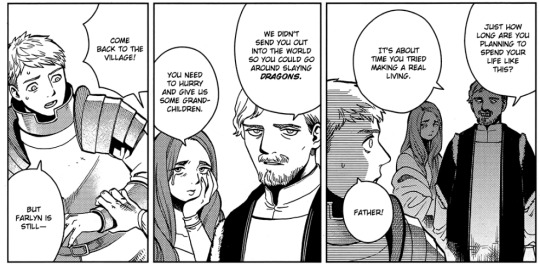
We get a glimpse of what happens when he fails to live up to his father's expectations when Falin is born. He expects a certain reaction from Laios and when he fails to give that reaction he physically puts him down, dismisses him, and underestimates how much he understands.
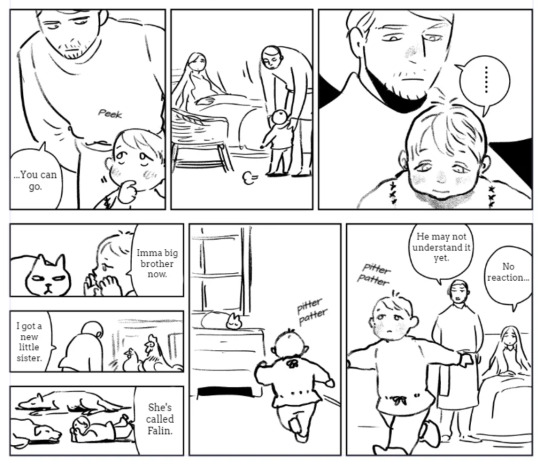
And that's something that's shown to be a bit of a sore point for him - people thinking that he doesn't understand something because he doesn't express himself like people expect. The few times we see him snap at people are because people think he isn't understanding something because he isn't reacting "normally".
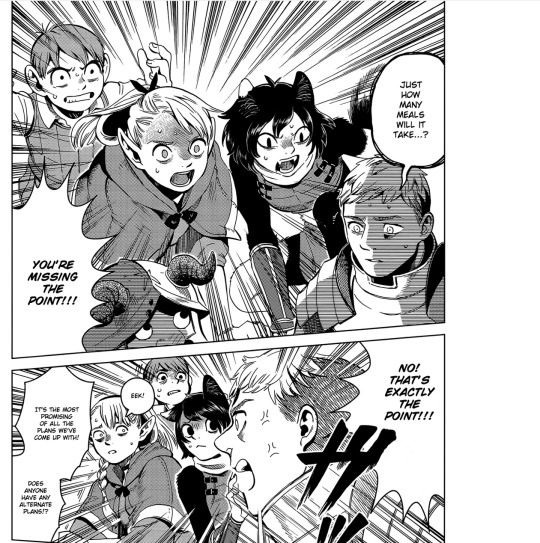
On Falin's side, the expectations seem to be a lot different - she's the younger one, for one, she's a girl, and she was so young when the fallout from her having magic happened. She too had an arranged engagement, but that was broken off when she was sent away to magic school and since then, their parents only seem to be passively involved in her life. She's mostly been freed of the expectations that their parents had for her in her village - she won't be coming back after all. She understands why they sent her away, she wasn't completely oblivious to the villagers treatment of her and it was, arguably, for the best so she is at peace with what their relationship is for now. But she still wants to go to her hometown and see for herself with adult eyes because she has never really had the space to do that.
I don't think their parents are inherently evil people - the truth is probably somewhere between Laios and Falin's version of the story, Laios' side tinged by too much cynicism and Falin's by too much naivete.
It just strikes me that when he tried to provide the "normal" way he failed, but given the space to do something similar to what people expected of him, but in his own way, he succeeded. He isn't perfect but his efforts are ultimately fruitful and he is able to carve out a place for himself, Falin, and others who had been ostracized like them to call home.
#dungeon meshi#dungeon meshi spoilers#dunmeshi analysis#laios touden#falin touden#i have a lot of touden feelings#i'm not letting mama and papa touden off the hook that easy#dunmeshi spoilers
6K notes
·
View notes
Text
seeing this part is what actually convinced me that ryoko kui knew about autism and wrote the siblings like that on purpose

i struggled finding way to explain why until now
as you can see ever since he was a kid Laios was especially sensitive to other people's expectations, which stresses him out. but Falin herself didn't seem to notice.
yet as adults we see that they grow up to be seemingly opposite of who they were as kids. as per his relationship with Shuro we could see that Laios didn't notice Shuro's distaste against him at all until he was told and with Falin she pays special attention to people and takes care of them to the point that becomes her most memorable trait to her teammates.
honestly it's the kind of progression that i've seen a lot among autistic adults. for laios i usually see it among people who finally found a comfortable space to be themselves and be immersed in their special interest. the happiness can get you kinda tunnel-visioned.
while with falin i feel like she's similar to me where we realized that the things other people usually notice easily doesn't come naturally at us so we end up compensating by working hard at being considerate to our friends but ends up being able to notice little tells others don't usually see
sometimes it's not even two different people, sometimes it's the same autistic person going through all of that
8K notes
·
View notes
Text
Soooo I read all of Dungeon Meshi in this past week and I have many thoughts bouncing around in my brain and I think the only thing to do with them is some AGGRESSIVELY CLOSE READING of a scene I wanted to come back to and try to understand better.
So: I want to talk about chapter 28
This entire section of the story is something I feel like I am going to want to come back to a lot, because its such a transitional time and I feel like there are a lot of themes/ideas that I wasn't fully aware of during my first reading, and stuff I missed because of that.
One of the biggest things I have been turning over in my head is... hey, what was UP with the Marcille/Falin bath scene? Maybe it was because I was already primed to pay attention to stuff with them going into the story, or because I had already seen a couple of panels out of context. In any case, it really kind of stuck out to me as being very short but also VERY intense, while also being... hard for me to define? Some part of the nature of the intensity felt like it was going over my head.
I wasn't sure that revisiting it would help with this right away, but to my surprise, it actually WAS a lot easier for me to follow and understand when I went back to it. So I want to just do a close reading of That Scene and some other parts of the chapter & context around it all, because I think it offers insight into Falin & her relationships, and what purpose this chapter serves within the story as a whole.
So first of all, I think it's interesting that the scene starts with Marcille bathing Falin.
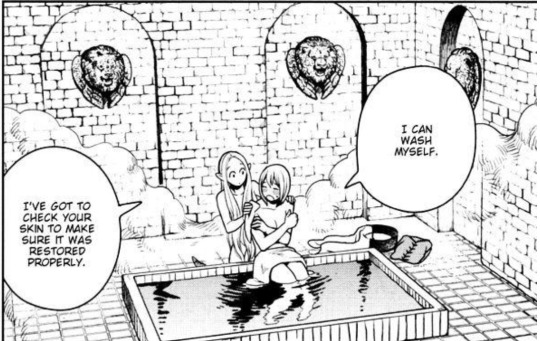
It feels very caring in a more platonic, less charged way then what will follow.
Marcille goes from this caretaker mode to joining Falin in the bath, and then of course we get the first of The Panels
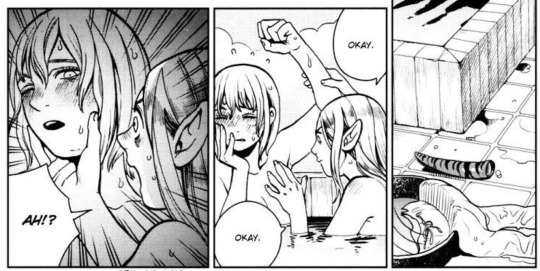
(as a small note, I only noticed when revisiting that Marcille is using the rest of her Kelpie soap in the bath. Isn't that just the most heartwrenching little detail. Augh)
Anyway, one of the first things I thought was interesting going back to this is how much it reminded me of the very different sort of intimacy that came just before it - when Laios and Marcille assembled Falin's bones.
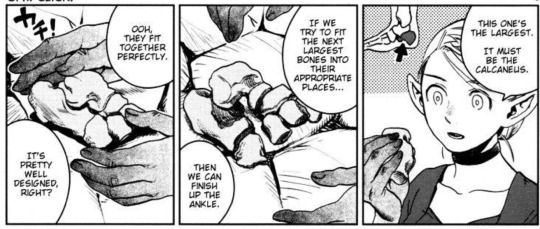
This is such a beautiful and intimate sequence, and something about Marcille examining Falin, whole, after the fact... I can't imagine there are not some echoes of those bones in Marcille's mind. The action seems more startling/intense for Falin at first, and maybe part of that is because Marcille has already experienced this level of intimacy with Falin's body in a way Falin herself wasn't a part of.
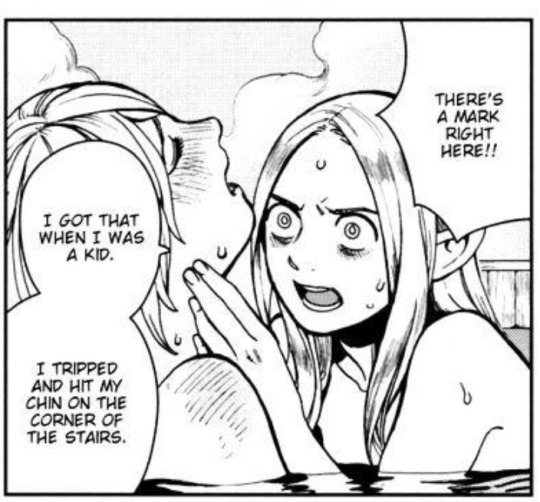
This panel in particular I think is a summation of the difference in the experience for them. This looks like... near orgasmic for Falin tbh, and Marcille is very focused on the actual like practical part of what she's doing, seemingly completely unaware of the Effect she is having on Falin.
The whole short sequence is focused on this intimacy that Marcille initiated seemingly without fully being aware of what she was actually doing. And once Marcille is satisfied, she is also the one that ends it, sitting back in the bath and moving out of Falin's proximity. All on her own terms, and for her own ends.
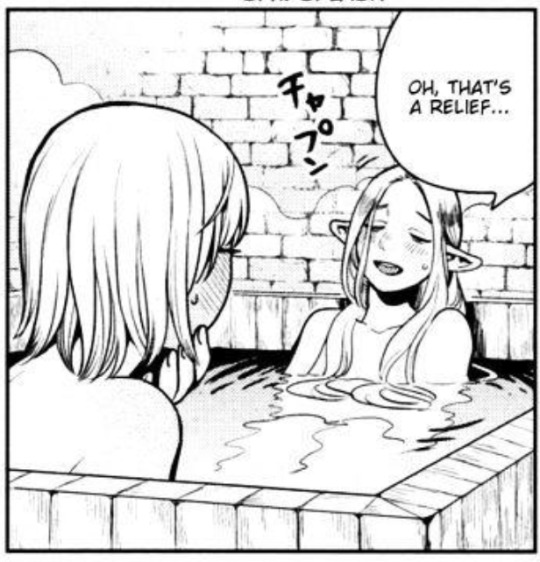
HOWEVER... Falin doesn't just let things go.
Instead, she returns Marcille's attention. First, by asking after her wellbeing:
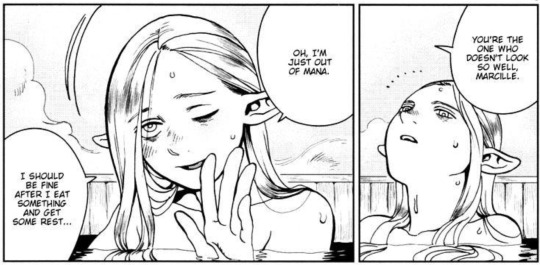
Marcille, of course, deflects (there will be a lot of that in this scene).
But Falin doesn't let it go.
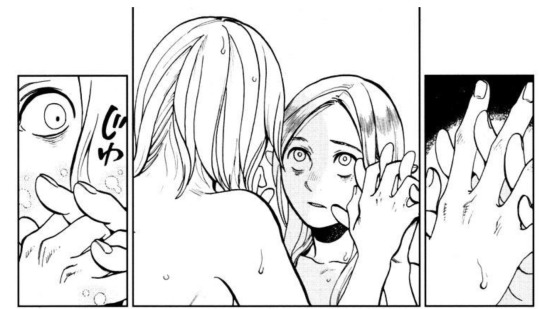
Falin is not a confrontational person. She likes to keep the peace. In this context, and in context of the way that Marcille was the one to come into Falin's space initially, the way that Marcille controlled the initial intimacy... this is striking. I genuinely think that these three panels might convey one of the most assertive actions Falin (as herself) takes in the entire story. One of the only things that outdoes it is the fucking INCITING INCIDENT OF THE WHOLE STORY.
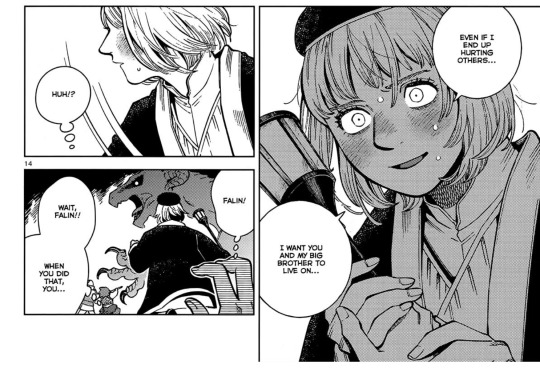
I'd also like to point out here that this action of Falin's also parallels her resurrection by Marcille & Laios. It's is also a forbidden magical action done to save someone(s) she loves, and its something she does TO them, that they are not fully aware/able to react to until its done.
Anyway, back to the bath scene. Falin is taking action here and asserting herself. And how does Marcille react?
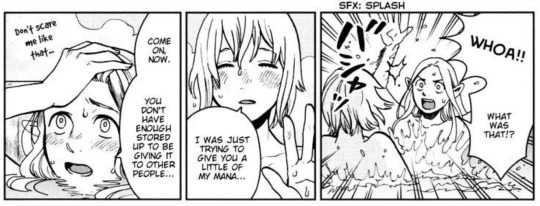
She flips out!! She rejects it! She tells Falin that she isn't supposed to be acting like that.
It's a very distancing response from Marcille, and also one that puts her back in that caretaker mode from the start of the scene. She also puts even more distance between herself and Falin by sinking into the water.
Falin doesn't give up though! She continues to assert herself. She's okay, she is allowed to chose to do this.
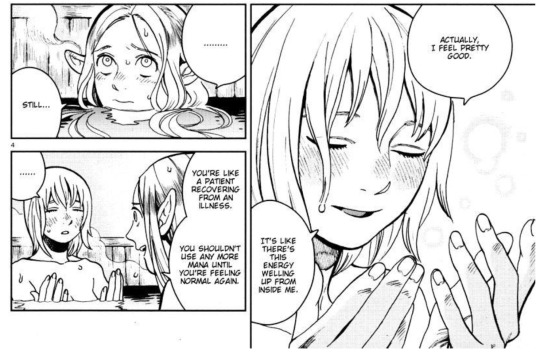
And Marcille continues to push her away. It looks to me like she only starts to relax a little once she fits Falin into a role she can better define and control. You're a patient, you're recovering, I understand this fact and you don't. Let me take care of you.
But, for a third time, Falin pushes back.

I don't think it’s coincidence that this is where she opens her eyes. She asks directly about the thing that they have both been dancing around:

The resurrection spell. The fact that Falin KNOWS about this, at least in part, recontextualizes the quiet battle for control between the two them. They both know at least some part of the truth. Marcille wants nothing else then to ignore it. Falin wants to be able to talk about it. Marcille's blatant refusal to give her those answers, I think, is what keeps them out of sync - intimate only ever in one direction at a time, never fully together.
And of course, even when directly confronted, Marcille refuses to engage with the truth.
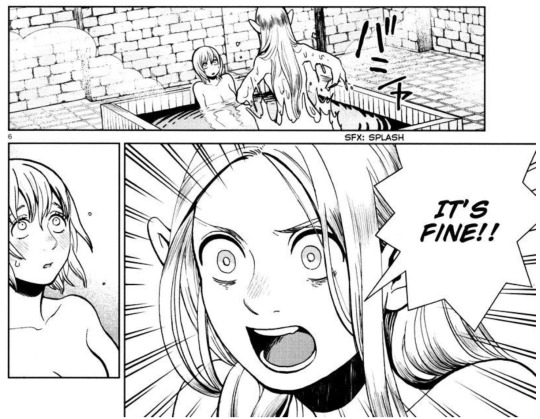
This moment being on the bottom of the page is notable too. There's a beat here. The last panel holds on Falin's face. The reader reaches the bottom of the page, and they are held here for a beat as well, with Falin. It's not quite a rejection yet. What Marcille says isn't directly an answer to Falin's question, but it is a response. A valid one, even! Falin wasn't just asking the question after all, but struggling with guilt that Marcille has every reason to want to reject.
But then you move on the next page, and...
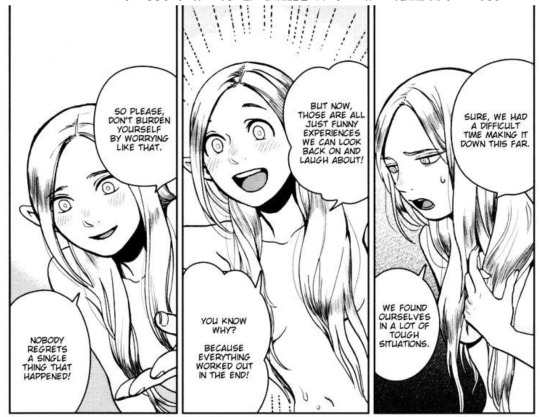
Marcille isn't actually addressing the question at all, not directly. She's deflecting, again. Oh we had a ~difficult time~, there were a lot of "tough situations." Even though she and Falin both know about the resurrection, and Falin has made it clear that she wants to talk about it, Marcille pushes away from the actual topic. She keeps things broad and indirect.
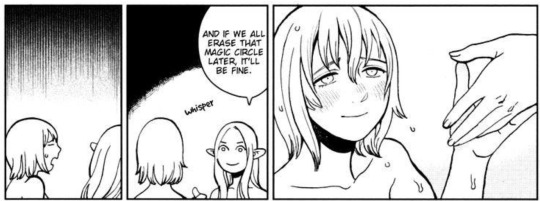
She offers the smallest gesture to Falin - nothing more than a whisper of 'don't worry about it I won't get in trouble' (even though Falin's concern was never just about Marcille getting in trouble).
Marcille then continues to deflect even further, completely changing the subject onto clothes and frog adventures, which seems to distract Falin as well, as she finally gives up on pushing.

And that's where the scene ends! Marcille pushes into Falin's space (without fully realizing), and Falin pushes back. She tries three times to get Marcille to acknowledge her wants, and three times Marcille rejects her, though she does eventually convey some truth. She is honest in her belief that Falin doesn't need to feel guilty, and that things will all work out, even as she continues to deflect the rest of the question. Falin finally accepts that, the topic of conversation changes, and we move on.
But there is a little bit more that happens between them. Towards the end of the chapter, they have this little 'oh no we have to share a bed' situation. Classic stuff.
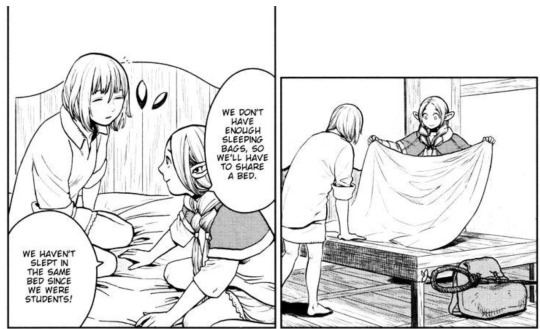
And Falin seems to realize that the context of this is kinda different now then it was when they were in the magic academy. She's not a kid any more, and they just had those intimate moments in the bath. There's a new tension between them, or one that new at least to the bed sharing of it all.

And in this respect, too Marcille pulls away from what Falin is trying to say. She tries to frame Falin as a kid, tries to insist that nothing is different.
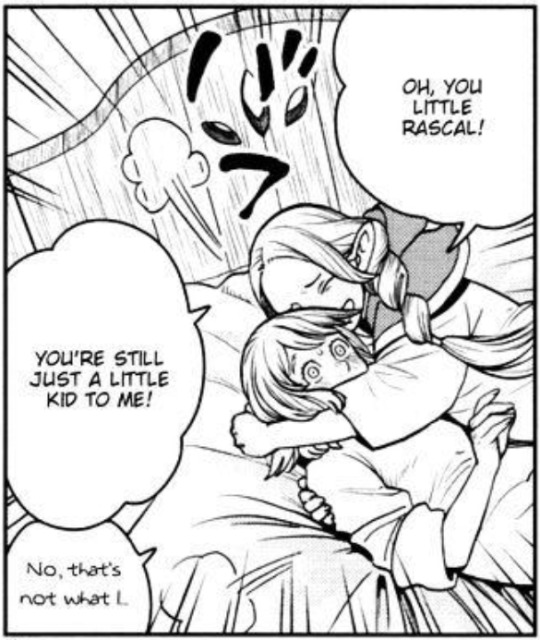
When I first got to this part, it honestly felt... a little uncomfortable? After the bath scene, it is really weird to move into a new intimate situation with Marcille explicitly treating Falin as a kid.
What I have realized in coming back to this scene, though, is how much I think its meant to feel uncomfortable. Throughout the chapter, Marcille's responses to Falin become increasingly patronizing. By letting some of that conflict between them resolve at the end of the first scene, the chapter seems to let things rest, and lets you set it out of your mind.
Then, when the same type of conflict comes back at the end of the chapter, Marcille is even more blatantly treating Falin like a kid, and the unfairness of it hits even stronger. They are both adults, and Falin deserves the truth. After 27 chapters from the perspective of Laios, Marcille, and the others in the group, this progression lets you feel things from Falin's perspective. It's supposed to feel uncomfortable because it IS uncomfortable for Falin, the way no one will quite tell her the truth.
After all, Marcille isn't the only one to do this kind of deflecting when Falin tries to ask about what happened. Laios has a similar response, right down to the 'treating her a bit like a kid' part.
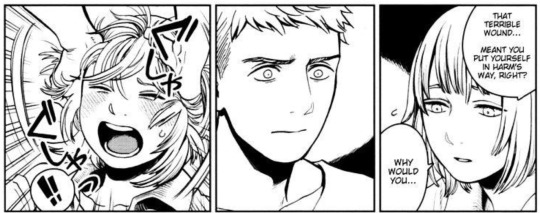
Even more importantly, this final conversation of the chapter reveals one last layer in the knowledge/power imbalance between Falin and the rest of the party: she doesn't actually remember sacrificing herself and teleporting them out.

As I mentioned before, that action was one of the most assertive things we see Falin do in the story, and she doesn't even get to keep that for herself. Instead of being her action, her choice, it becomes yet another thing that the others know more about than her.
I think that's part of why there is such an air of melancholy to this hug they share on the next page
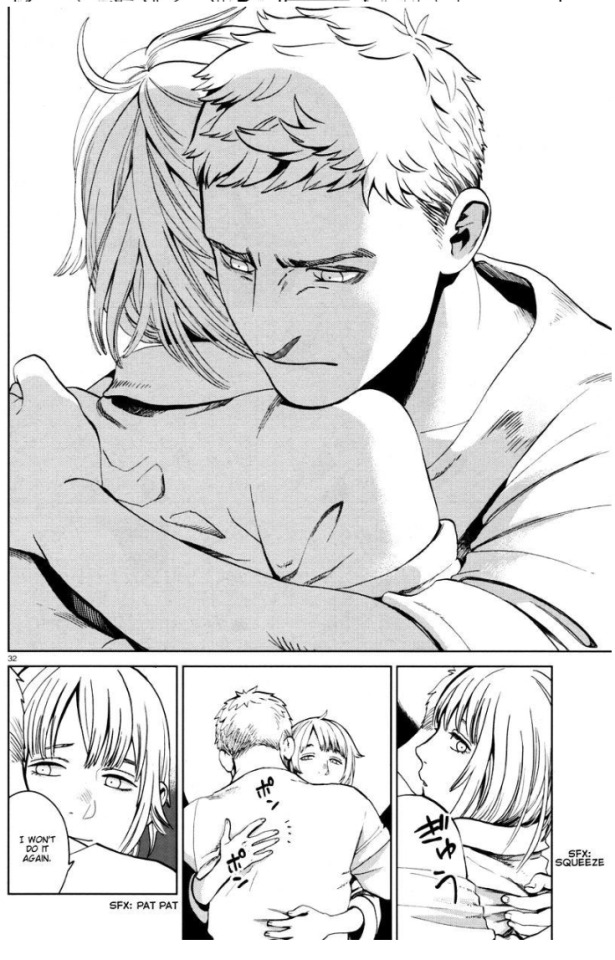
Obviously, obviously, there are so many emotions here for Laios and I don't think its all meant to be viewed as a negative thing, or that he or Marcille are being completely unreasonable. They've been through a lot, and what's more, they think they have time now. So much more time then they actually will have. Time to explain, to open up, to let Falin return to the group in full - as a teammate and not just as someone to be cared for and protected.
But they don't get time. And this relenting by Falin, this "I won't do it again," it's not something that feels triumphant. It's an attempt to comfort them, more a prayer than a promise. As if she is trying to exorcise a spirit. As if she is capable of promising that death won't come, eventually. It's what Laios needs, not what she wants.
That's the real tragedy of the chapter, I think. It's the one time, in the midst of everything, that they have the chance to give Falin what she wants - and they don't do it.
But I do think they realize that, and I think that this failure is a core part of their journey. It's another bittersweet taste to add to the mix - all the missed chances in this chapter to connect, amidst the moments of genuine peace they do get throughout it.
As Laios puts it later...
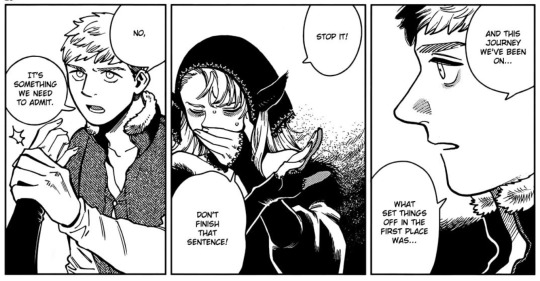
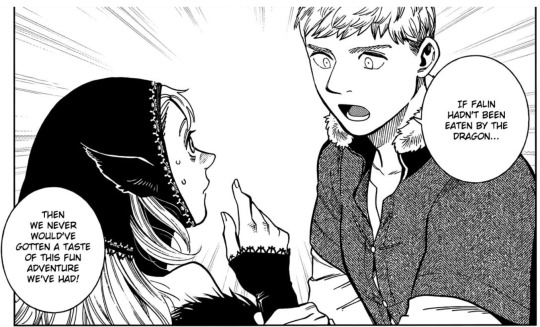
If Falin hadn't been eaten by the dragon, and perhaps if they hadn't failed her here, they never would have had the adventure that they got to share.
(or, perhaps more tactfully: in life & chapter 28, there are both good times and bad. Thanks, Chilchuk)
#dungeon meshi#delicious in dungeon#falin touden#marcille donato#laios touden#dunmeshi analysis#dungeon meshi spoilers
2K notes
·
View notes
Text
How about an analysis of Dunmeshi's latest episode?
What I find really interesting, and episode 17 made me realize it, is the extent to which Laios and Shuro are the opposite of what they portray, even worse: the image they might portray is actually that of the other.
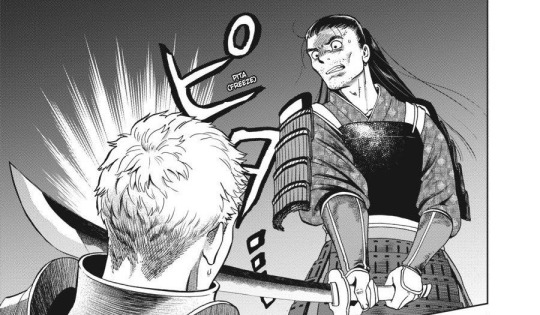
Let me explain :
How does Shuro see Laios ? As someone stubborn and thoughtless, disconnected from reality to the point of using black magic to resurrect his little sister.
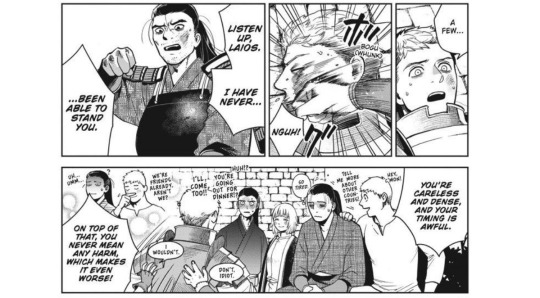
We know that Shuro would have made the same choice, which shows that even if he tries to deny it, there is a point of connection between them.

The key to these similarities and differences is Falin.

What Shuro loves about Falin is the tenderness in her every gesture, her compassion and understanding of every creature, and her smile.
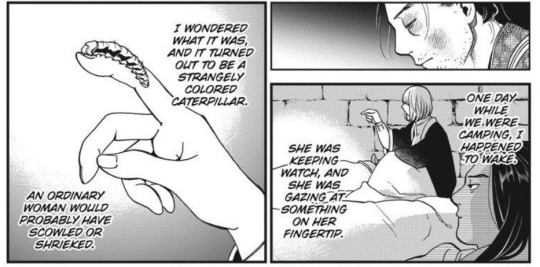
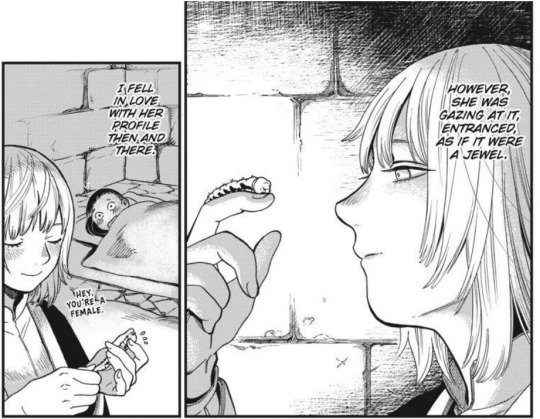
When he sees this monster kill in cold blood, he realizes the extent to which he has lost his loved one, which is why he chooses to kill her to free his soul, thinking he has lost her.
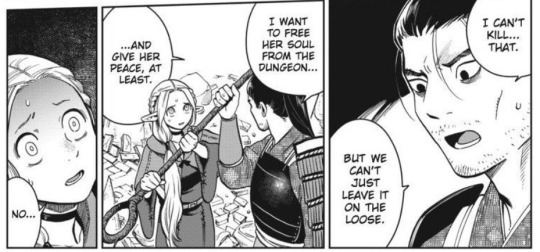
But what Shuro doesn't realize is that he's exactly what he's blaming Laios for: he's stubborn and reckless, not realizing the danger and sacrifices his teammates are making for the sake of this mission.
He's also disconnected from reality, not caring about himself, his hunger or his fatigue.
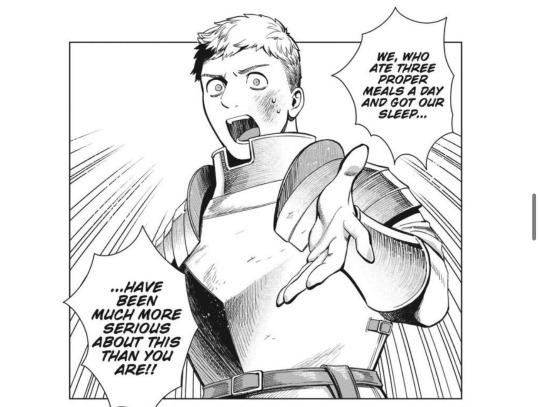
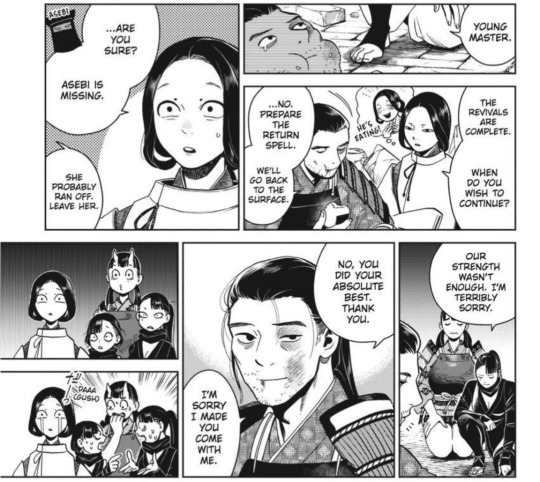
Above all, and this is very interesting, Laios had said that he hadn't perceived that Shuro couldn't stand him because he was so happy to have him as a friend, that he hadn't detected any of these signals.
Shuro shares this blindness

Shuro repeats that this monster is not Falin, yet he sees her as such, to the point of embarrassment when the monster removes her blouse.
And that's the opposite of Laios, who sees his sister as the monster she is
Like the chimera Falin has become, he sees his little sister calling him and this super-cool monster.
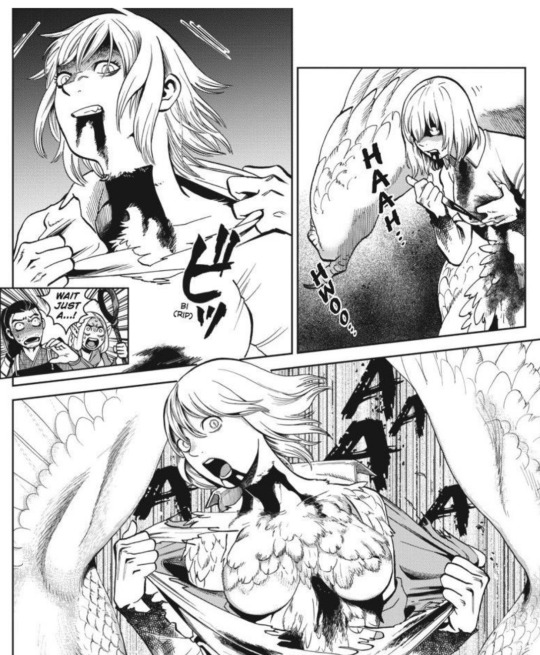
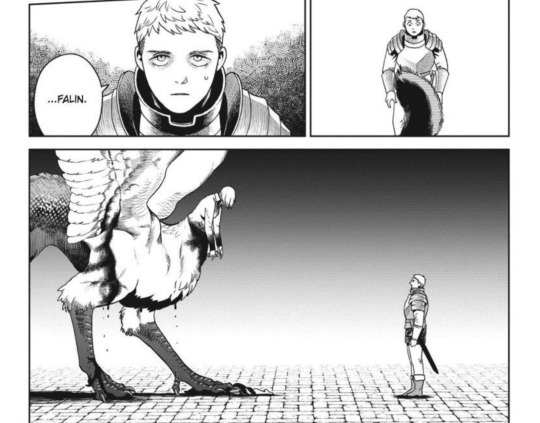
He's the one with his feet firmly on the ground, he's the one who really cares about his team, taking care of himself and those around him through balanced meals.
The one who understands that Falin has many vital points, rather than allowing himself to be overwhelmed by despair, is Laios.

So when Shuro hits Laios, in reality he's not hitting a man who differs from him, he's hitting his own flaws, and his own failure in the situation.
This failure he projects onto Laios, a man brimming with flaws.
Not only does Laios reason with him, but if Shuro ends up taking the wiser path, it's also because he's literally fought against himself.
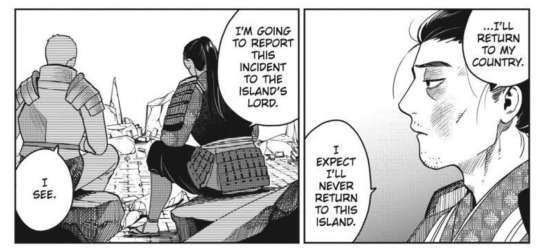
But it all goes even further!
Shuro realized his feelings, or rather how unique Falin was in her tenderness and altruism, towards every being, even the smallest.
But what set this whole cycle in motion was Falin's self-sacrifice, her own death.
Laios and Marcille are responsible for what follows, but they are not responsible for everything, as Shuro tries to believe.

Shuro refuses the truth
So he doesn't see Falin
He couldn't accept that her tenderness had led to his death
Nor that her tenderness gave way to extreme coldness and indifference
He won't accept his own blindness
So he hits Laios and his extreme sincerity that irritates him so much

Shuro can't see anything in the darkness of this dungeon, he's the one who's lost his footing so he has to get back up again
Laios has accepted to see everything, even the unavowable, the forbidden, the pain.
What Shuro sees in Falin is love
In Laios, what he sees is the truth
In reality, Laios has only told part of the truth; he is the other half.

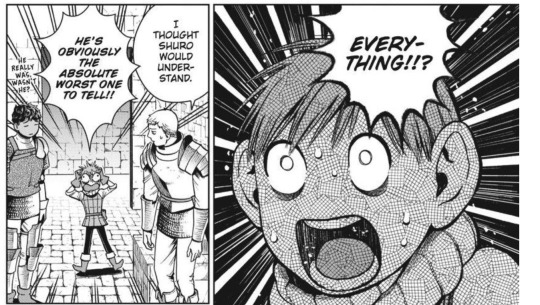
But if he goes back up, it's not to abandon Falin, Shuro has to face reality, the truth, that Laios was the only one who could save his beloved.
It was by fighting that he finally put his trust in Laios.
And finally became a friend
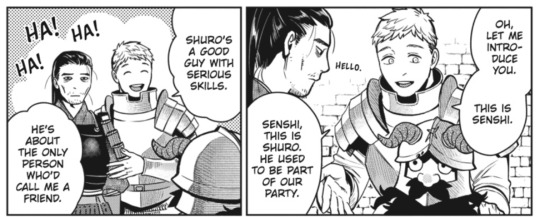
#dunmeshi anime#dunmeshi#dungeon meshi#delicous in dungeon#dunmeshi ep 17#dungeon meshi 17#episode 17#shuro#laios dungeon meshi#falin dungeon meshi#marcille donato#falin touden#laios touden#chilchuck#analysis#dunmeshi analysis#dungeon meshi chapter 35#dungeon meshi chapter 36#dungeon meshi chapter 37
516 notes
·
View notes
Text
I love how a lot of the jokes in dungeon meshi are often disguised foreshadowing. Like the times when Senshi is holding something super hot and Laios comes in contact with it and gets burned. It happens when they’re getting oil from the dungeon trap and Senshi has his finger in it while Laios has a single drop land on him and it ends up making him fall to the ground. It again happens when Senshi’s holding some of the living armor on a steaming hot metal plate then tosses it to Laios who again falls from sitting and throws the food after panicking.
This all sets up for later when they’re fighting the dragon! Laios has a clear pattern of underestimating heat when Senshi is holding hot ass shit so it makes sense to the audience when he over looks the glaring flaw of the dragon’s fire breath heating up the pan as it shields them. Idk if it 100% connects but I really like that build up gags like this end up creating.
#laois dungeon meshi#dungeon meshi spoilers#dungeon meshi#senshi#senshi of izganda#laios thorden#laios touden#dunmeshi#dunmeshi spoilers#dunmeshi analysis
348 notes
·
View notes
Text

God this really hit me hard. I think one of the worst things about being Autistic is that people just fucking despise you and hate you and you don’t fucking know why. Why is talking about my experiences bad? Why is ensuring the safety of my little sibling bad? Why do you hate me all of a sudden? Why? And people wonder why our suicide rates are so high.
247 notes
·
View notes
Text
I should probably just avoid fandom discourse altogether but the mischaracterization of Toshiro is really starting to get to me (and this isn't a case of "my poor precious blorbo I'm the only one who understands you" because tbh I don't think he's in the top five of my dunmeshi faves)
The main issue comes from his relationships with Falin and with Laios. "He loves Falin for everything he hates Laios for." No, wrong. Does he maybe romanticize Falin a bit as a manic pixie girl with a refreshingly original personality and interests? Sure, yeah, but the thing is, he doesn't hate Laios for his monster special interest.
One thing Laios and Falin don't have in common is their way of expressing themselves. While Laios is very outspoken and talkative, Falin tends to be more quiet and reserved. Just think about the flashback to magic school when she first met Marcille. If that had been Laios, he would've also been the kid who shows up late covered in dirt from chasing grasshoppers, but he wouldn't have kept to himself like Falin did until Marcille approached her. He would've gone around the room saying, "Hi, I'm Laios, let me tell you about my project and why it's weird."
That's why Toshiro is upset/annoyed/envious around Laios ("hate" is the wrong word to describe their relationship methinks). He finds him abrasive and insistent and blind to the hints that maybe he should shut the fuck up for a second please.
#things not covered in this post bc i didn't want it to become infinite:#Laios isn't in the wrong for being the way he is and not getting social cues#Toshiro is not in the wrong for not having the tools to express his annoyance in ways that aren't social cues. or punching.#and there's probably an analysis to be made as to WHY Laios and Falin express themselves different in relation with their upbringing#but i got tired of sitting on the toilet writing this and i really need to take a shower now bye#dungeon meshi#dunmeshi#laios touden#falin touden#toshiro nakamoto#discourse#dunmeshi analysis#mogologue
85 notes
·
View notes
Text
No one is ready for the Aragorn/Kabru comparison post including me but I’m not gonna put more thought into it so here we go
Both:
Raised by elf
Strong main character energy but not the main character
Hair
Excellent stabbing (Aragorn has the advantage of almost exclusively humanoid baddies but the warg got ‘im good)
Likes to pretend to be brooding and very solemn
Strong moral code
Big king energy, natural leaders of their groups
All ‘bout that noble self sacrifice if necessary
Will also do Whatever It Takes
Dedicated inner monologue to figuring out everyone else’s intentions that defaults to stabbing (I cannot prove this in Aragorn but just look at him in Rohan and talking to kings)
“Effortlessly” resists magic temptation (ring/demon, both had higher priorities)
Have a “friend” they worry will fall to said temptation (Laios/Boromir but listen Kabru & Boromir clasping hands about dying Too Fucking Much)
Do not actually want to be king personally and would really rather not, but are aware there might not be a better option
I Am The Last Of My Line(/Village)
Differences:
Kabru’s better at avoiding being king (buuuuut still ends up in the court so)
Milsiril didn’t have a handy daughter (but listen to my Unhinged Conspiracy Theory About Milsiril Taking Mithrun Home To Train Okay)
#delicious in dungeon#dungeon meshi#dunmeshi analysis#delicious in dungeon spoilers#dungeon meshi spoilers#kabru#aragorn#lotr#this came to me in a vision
64 notes
·
View notes
Text
just finished reading dungeon meshi after starting it like 3 days ago and i am absolutely and all-encompassingly obsessed with it just like the overall theme of food is good and life and its everything and just how we are a part of everything and we are who we are and what we are because of those we love and know and exist around
and i loved all of the character arcs about desire and theres always more things that will make us happy even when we can't see it, and that theres nothing wrong with leaning on other people, and how growth happens and acceptance of what we can and cant do, and about sacrifices freely given for those we care about, and oh my god just everything about it
please come into my messages and talk with me about it cuz omg
#dungeon meshi#dunmeshi analysis#my god just everything about it#makes me want to learn how to cook up anything#i want to be a chef oh my god#i want to be like senshi </3
54 notes
·
View notes
Text
Hey it’s infodump/analysis time babey:
I’m so obsessed with Breezeblocks (Clem Turner’s cover specifically) and it’s relation to Where The Wild Things Are with the lyrics ‘oh please don’t go, I’ll eat you whole, I love you so!’ which brings to mind the whole of DunMeshi as a concept.
In the context of the original children’s story, (not the song) the term ‘eating whole’ is used as a way to express that you love someone so much, you just can’t contain your feelings about them, they’re bursting and you want to devour those feelings because they’re too much.
Very relatable in an AuDCDHD way and general feelings of overwhelm when you struggle to express yourself in a way that’s easy for NT people to understand. It’s also used in the way that it’s supposed to represent love of a familial kind where you pretend to eat babies hands and they laugh, or saying ‘I’ll eat you up!’ to kids when playing chase.
People generally think that the expression of ‘We’ll eat you up— we love you so!” in the later part of the story (and the beginning) is used in a purely malicious way but it’s not true. It means to completely shower someone with love and affection, in the same way as ‘cuteness aggression.’ It CAN be used in a darker way, and used in adult contexts (like in the song), but it just got me thinking a LOT about Laios and how he might feel/see the world and his party. As a wild thing that doesn’t quite fit in/can’t express himself as clearly as others might want him to/someone obsessed by the idea of consumption.
#dungeon meshi#laios touden#dunmeshi#dunmeshi analysis#dungeon meshi analysis#idk if this is anything but I am obsessed with these lyrics and the different emotions surrounding them#analysis
31 notes
·
View notes
Text
I want to talk about why I think this is the one of the most important Falin panels:

So, Falin is really nice, right? It's one of the first things we really learn about her. She's kind even to the monsters of the dungeon - choosing to ward the party rather than fight spirits and cause them needless harm.

In the above early flashback in chapter 11, we see Marcille fawning over Falin's kindness, calling her an angel. Namari calls her soft-hearted. We see Falin choose not to fight even when a zombie attacks - instead she resolves the confrontation with a hug. After the flashback, the first thing Senshi says is that Falin "sounds like quite the person," which Marcille strongly affirms.
At this point in the story, all we have seen of Falin are these impressions; she is a healer, an angel, a caretaker with an infinite well of kindness towards everyone she meets - both friend and foe.
And honestly, that remains most of what we have to go by to understand her. The only times we get to see Falin on the page, alive and just herself, are in the opening and closing pages of the story and in the brief period of time after she is resurrected.
Nonetheless, we do have some more details to work with. For one, there is the scene that The Panel is from - a short memory in chapter 75, when Marcille flashes back to while she's dying. In that scene, Falin prepares to teleport them all out, and says that she's sorry "if there is a person at [their] destination." And that's when we get The Panel.
If you teleport someone or something into another person, the person teleported into is likely to be, at minimum, severely injured. They could die.
We can see a lovely little horrifying example of exactly why in one of the Daydream Hour doodles:
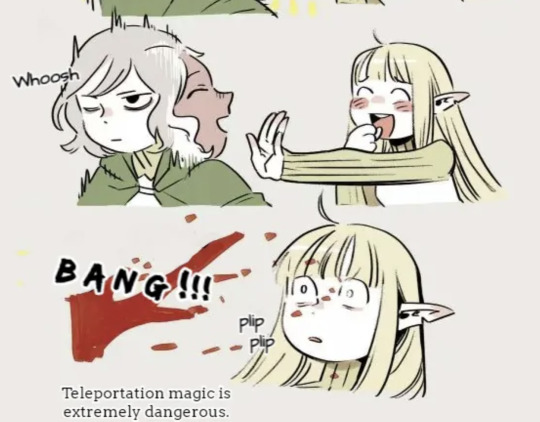
So, hmm. That's not... that's not SUPER nice. Certainly not displaying the same "kindness to all, friend and foe included" we saw represented earlier. On a basic level, this adds some nuance to Falin's kindness. We see it break a little, when pushed to the limit. We see her chose to protect the people she loves above all else.
Which makes sense! As Laios says when the Winged Lion accuses him of similarly being motivated more by his friends' safety than everyone else in the dungeon, "...most people, aside from virtuous do-gooders, would feel the same way."
So, we can take The Panel as simply showing a moment of weakness for Falin. A time when she was pushed to her limits, and that "most people" selfish side of her shone through.
However... I think there's a little more going on with Falin than just her being an angel 99% of the time, except just that once. I love The Panel because I think it helps us understand that Falin isn't just motivated by kindness - she also has a desire to avoid seeing people in pain.
Isn't that the same thing?
No, no it very much is not.
Let's look at a short comic from the Falin section of the Adventurer's Bible, because I think it illustrates this point perfectly. The group is complaining about how much Marcille's healing hurts, and comparing it to Falin's, which "doesn't hurt a bit." Marcille retorts with the following:

Now, the punchline of this comic is that, despite Marcille's sentimental assertion that she's "thinking of [them]" by letting her healing magic hurt, they all still prefer to be healed by Falin.
But hey, this wouldn't be the first time that Dungeon Meshi hides a very real character beat or insight in a gag, so let's think about this somewhat seriously.
If Marcille is right (and she knows a fair bit about magic, so we can assume that she has at least somewhat of a point), then what Falin is doing isn't kind. I suppose if someone specifically requested to not feel the pain, it could be kind, but that's not really what happened here. She is the one who felt badly about the others being in pain, and she is the one who decided, without telling them or giving them a choice in the matter, to take away that pain.
Both Marcille and Falin are healing the party, but Marcille is doing it in a way that accomplishes the task in the most straight forward way, without any additional interference. Falin is going out of her way to perform the healing in a way she is more comfortable with. A way that avoids pain.
Going back the The Panel, I don't think its a coincidence that the only time we see Falin (well, non-chimera Falin) willing to do something that could hurt someone is when any potential pain will be far away from her. If she got someone hurt or killed by teleporting the party to the surface? Not only would it be far out of her sight, but she'd be dead before she had to deal with any consequences of that action.
Falin is not a confrontational person. She doesn't push when Marcille won't tell her the truth about the resurrection, and she comforts Laios about her own death - both of those things happening in the only full chapter she is alive and conscious in the whole story.
We also know that she considered accepting Shuro's proposal, despite not having any special feelings towards him, and that Falin never explained to Marcille that she wanted them to share a meal together. When she brought Marcille various foods at the academy, she just accepted Marcille's confused rejection and gave up.
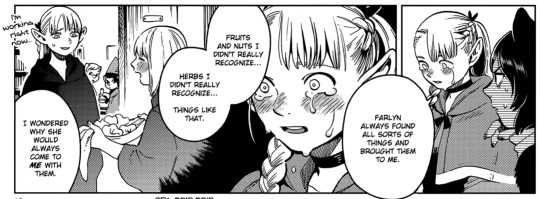
And lastly, we know that she is still in contact with her parents, despite the neglect and abuse she suffered at their hands. Although the way someone chooses to handle contact with abusive or bad family is a complicated topic, which I don't want to overly simplify, I do I think this fact gets at the heart of how she handles conflict.
So many people that Falin loves have hurt her. There are understandable hurts, like Laios leaving the village, or Marcille not understanding the food. And there are bigger, far less justifiable hurts - like her parents neglecting her throughout her childhood, and sending her away to be alone at the magic academy.
It doesn't seem like Falin has ever confronted any of it directly.
And the unhealthy aspects of this kind of avoidance of pain and confrontation is one of the things that the story of Dungeon Meshi is all about. We see Laios grapple with it before he goes to kill Falin, and we see Marcille acknowledge it at the end of the story, when she tells Laios that she has come to terms with Falin's death:
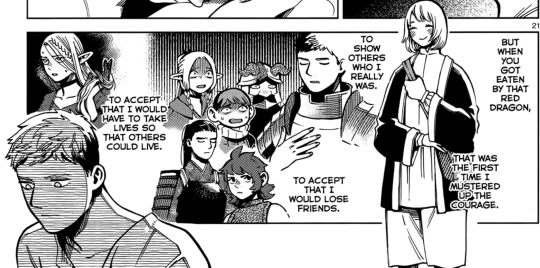

Eating is a part of life. Consuming other living things is a part of life. It isn't really possible to avoid that pain - you can only hide from the truth of it. You have to be selfish everyday. You have to eat - to choose to live. To choose to take up space.
And this is something Falin embraces, too. She comes back to life, after all.
We see her choose to come back to life.
And how does she make that choice? She eats. She consumes, and then she is asked a question by the manifestation of hunger itself:
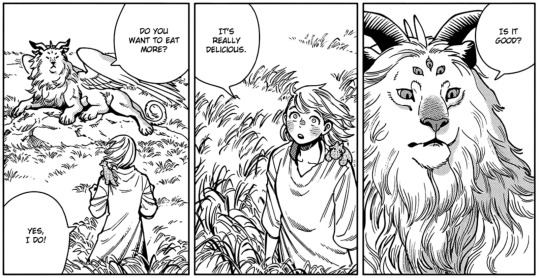
Do you want to eat more?
There is a double meaning in the Winged Lion's final words on the next page.
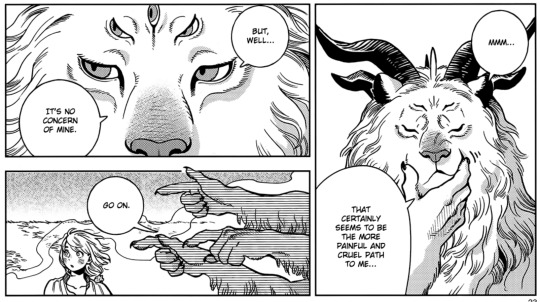
When I first read this, I took it as him saying: life is cruel. You will suffer. You will feel more pain.
But perhaps, especially for Falin, this also means: you are choosing a path where you must cause pain. Where you must consume. Where you must take, and must be selfish. Because eating is the special privilege of the living, and it is their burden, too. In order to stay alive, she will need to keep eating.
And she chooses that. Chooses to be selfish. It's why her resurrection scene is so important, and it's why The Panel is so important. Because Falin coming back isn't the ultimate reward for all of the party's hard work.
It's her choice. Just like it was her choice that started everything in the first place. But this time, she doesn't choose to accept causing pain for the sake of Marcille and Laios. She does it for her own sake.
#dungeon meshi#delicious in dungeon#falin touden#dunmeshi analysis#I love it when dungeon meshi says. the trauma was real and it changed you#and the way you are because of it isn’t anything to be ashamed of#but you have to keep living. you have to chose to keep living.#and you can#dungeon meshi spoilers
15K notes
·
View notes
Text
ok I mentioned this earlier and people were sort of confused but I’m gonna try to explain why I think the long AND short lifespan issues were resolved by the end of dungeon meshi.
WARNING: DUNMESHI SPOILERS AHEAD
-
Part 1: the lifespans aren’t natural
ok so I’m gonna start with that no I don’t think Marcille got her wish, at least not the way she wanted. Marcille wanted to bend the rules of nature so everyone would live an unnaturally long time. However, the lifespans that the races in dungeon meshi have (besides tall-men, but I’ll get to that later) are also not natural. They only had those lifespans because the winged lion was maintaining that lifespan for their race.
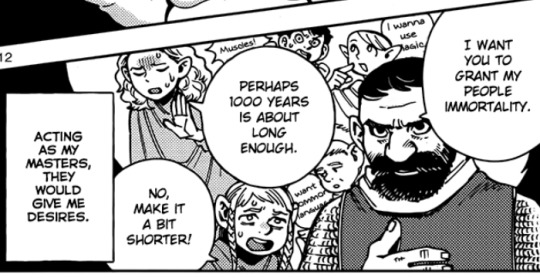
You can see at least 3 different races here that are asking for different life spans, what they’re asking for lines up with what the lifespans are.
the dwarf asked for immortality, the elf asked specifically for a thousand year life, the half foot heard this and said that was too long, and to make it shorter. The only ones who didn’t ask for a lifespan alteration were the (would be) tall-men.
The lifespans aren’t natural, they’re caused by the demons magic…
part 2: so what of the demons magic?
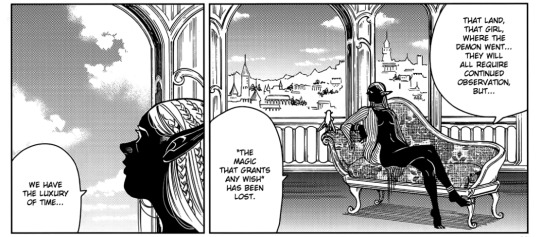
This is I think the most explicit statement, that the demons magic, every wish the demon granted, is lost. This includes lifespans, one of the oldest wishes it granted.
And I wanna highlight one thing she says specifically. “We have the luxury of time”.
I don’t think that means a long life, I think it means the opposite. The narrative regards these lifespans as unnatural, destructive and soul sucking. The immortal townspeople are cursed, time doesn’t matter to them, and so they have no desires, or drive to continue. This is depicted by them finding food flavourless.
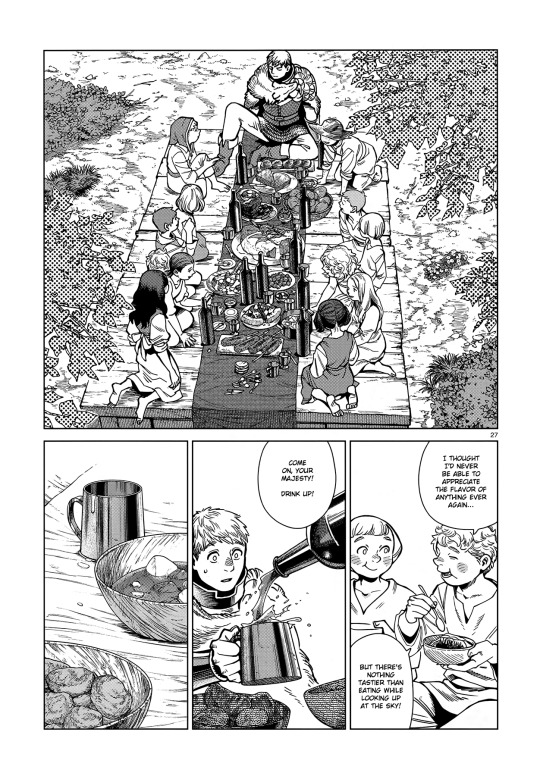
and when they no longer have immortality look at how they think of food. That is the luxury of time, not to avoid it, but to experience it. This is what the “long-lived” races must learn in the absence of the demon, now lacking the extra hundreds of years the demon had gifted them. That’s why it’s important that Marcille didn’t get her wish the way she wanted, because she wanted everyone to live forever.
And speaking of Marcille’s wish.
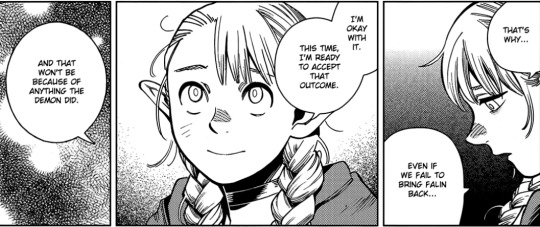
She says she’s learned to embrace death, and not because of anything the demon did. She wanted to live forever with her friends, she didn’t want to confront death. With the demons magic gone, she no longer has the extra thousand years. She’s learning to accept her friends mortality, yes, but she’s also learning to accept her own.
part 3: the theme of accepting death
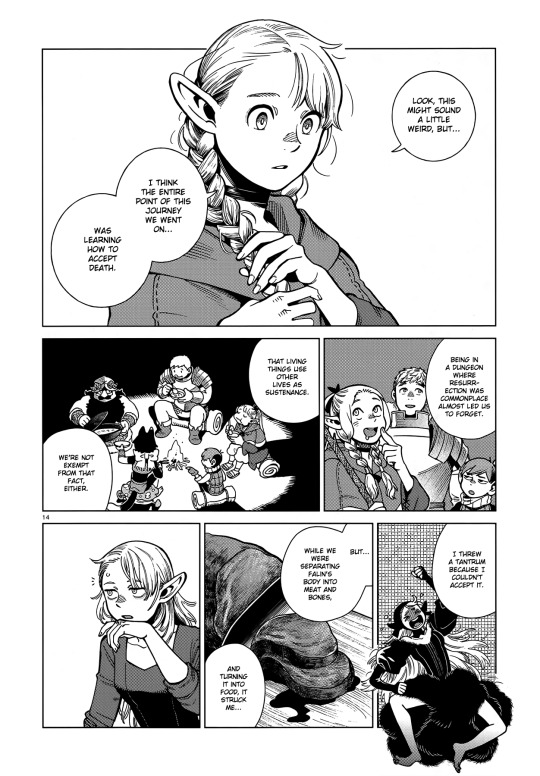
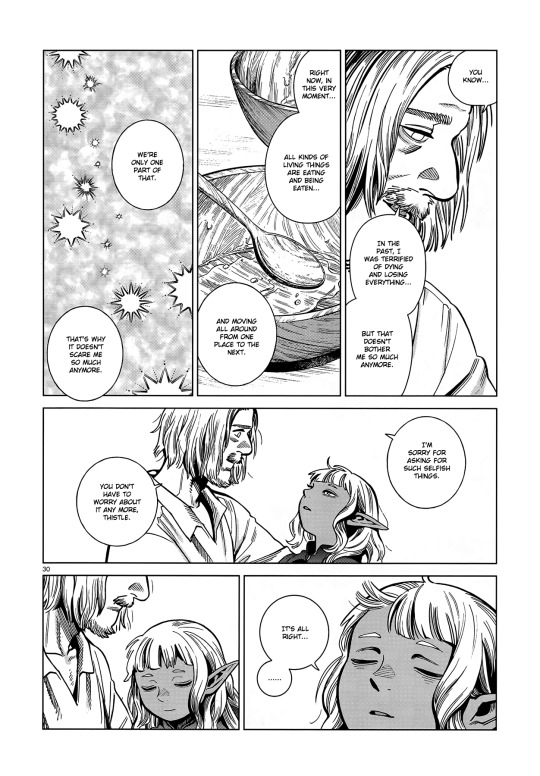
Like I said earlier, Marcille is afraid of death. So is Delgal/Yaad. The end of the story resolves their acceptance around death and dying. As much as Marcille wanted everyone else to live, there’s a reason she decided everyone should just live a thousand years. She doesn’t want to sacrifice her own lifespan, she wants infinite time with the people she loves. In the aftermath of the winged lion, she instead gets a much shorter amount of time. Delgal/Yaad is similar, in that he feared death. He says he was afraid of dying and losing everything, but now he’s ok with that reality, because the reality of an extended or eternal life was much worse.
part 4: the curse of living and the curse of living too long
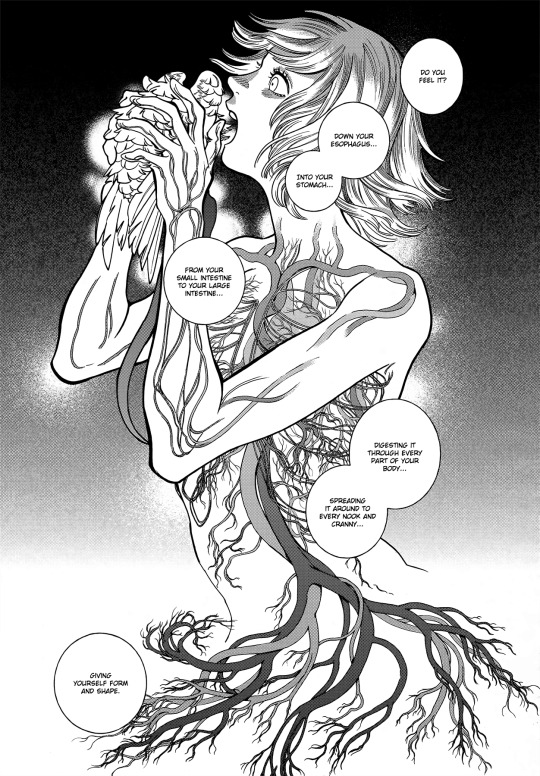
To desire is to eat is to live. Our most primal instincts.
The long lived races, while not immortal and desire-less, had an unnatural amount of time on their hands. They were able to forego their humanity because they’d been gifted all the time they wanted, which lead to fighting and oppression of the short lived races (which is why it’s important for Laios to be the king, even though the elves and dwarves have lost the demons magic. Their mindset at that point in time, is of people with too much time on their hands.)
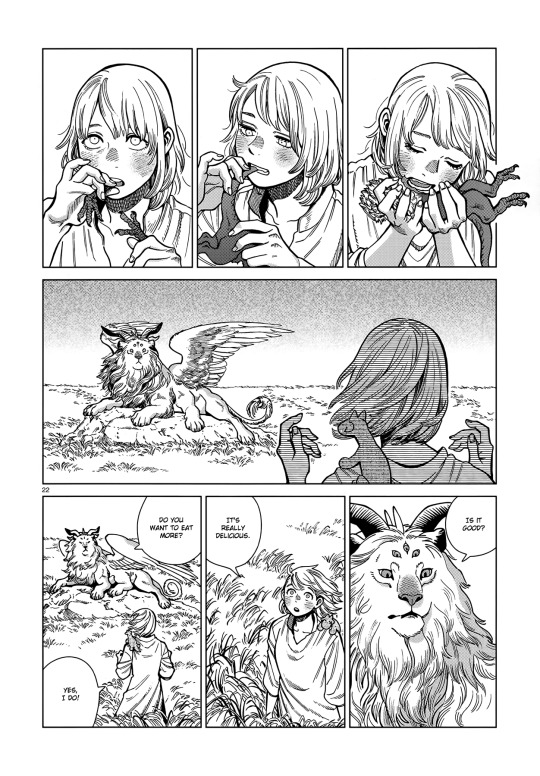
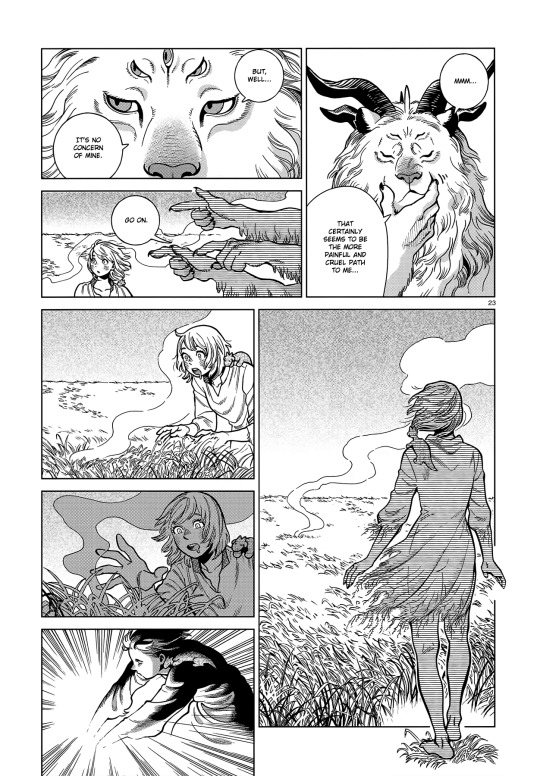
When Falin speaks to the demon, stripped of all his desire, he describes living as cruel. From his perspective, humans have a limited time and a constant desire, sorrow and anxiety pressing at them. Yet, Falin says it’s delicious. The fear inherent to living is natural, it’s what makes life interesting, and so it’s thematically important that the magic allowing certain races to avoid this reality isn’t maintained. Marcille’s wish was based in truth, it was how she went about it that was wrong.
Part 5: the end of the racial power dynamic
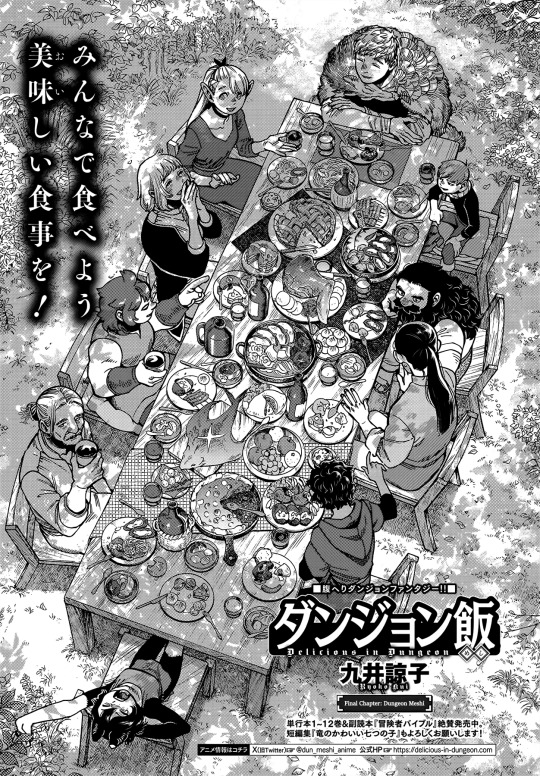
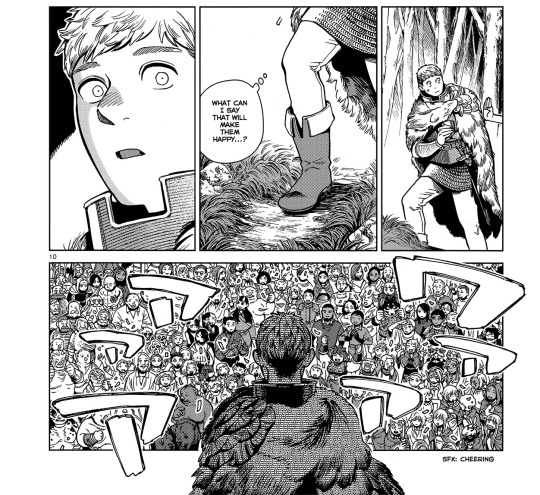
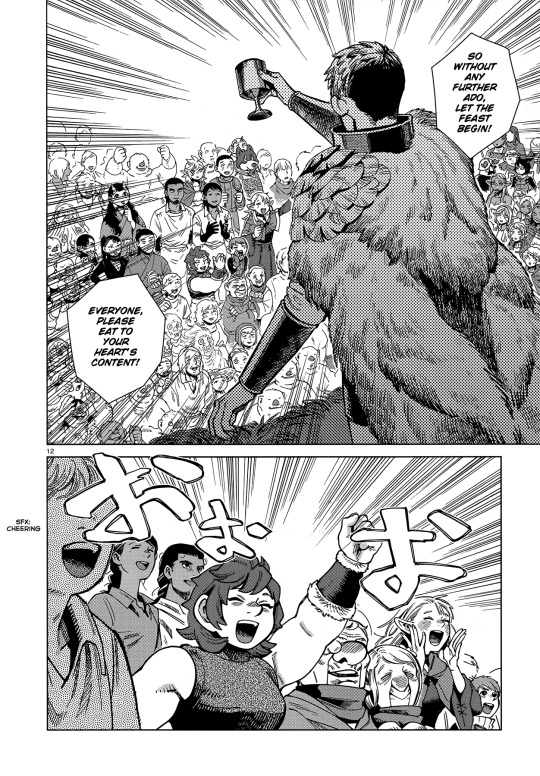
Obviously the races and cultures are still different, they were different before the winged lion began granting wishes, and will remain different, however what the narrative tells us again and again is that the lifespans are equivalent to a power structure. Elves and dwarves are at the top, because they were granted long lives. This power structure is explicitly not natural, it’s not how the races should be, Ryoko Kui emphasizes this several times.
So given this, I think it’s really important that at the end, when the demons magic is gone, all the races become one unit. There is no more power structure, is what this implies. One of humanities oldest desires, the desire to live eternally, is undone.
Ryoko Kui wanted to show that the racism and the power structures weren’t logical, and they weren’t natural, and now the people will have to navigate without those, without differences of lifespan, and without the ability to push away death.
part 6: conclusion
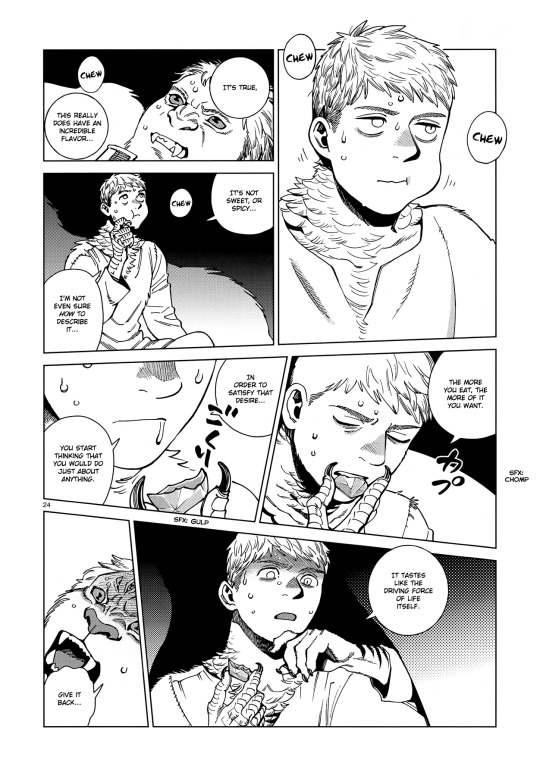
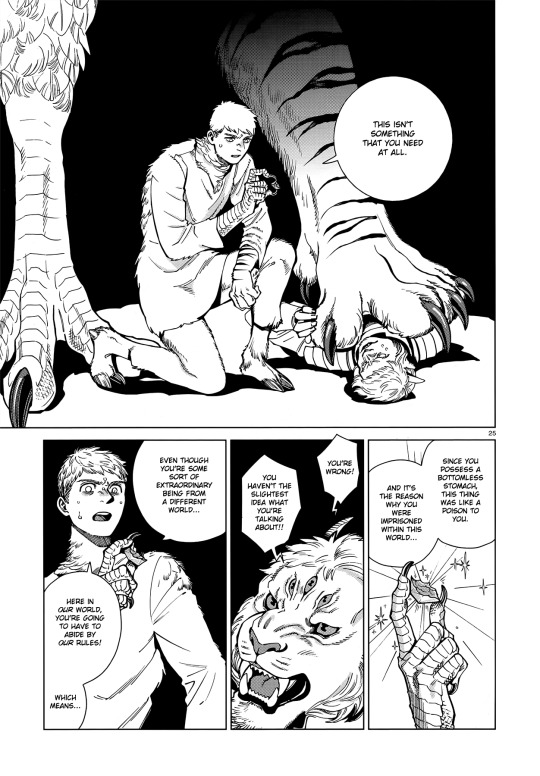
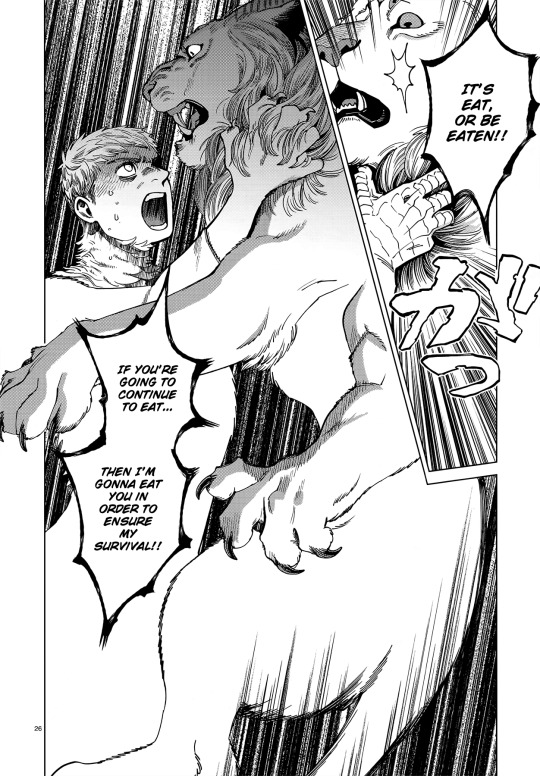
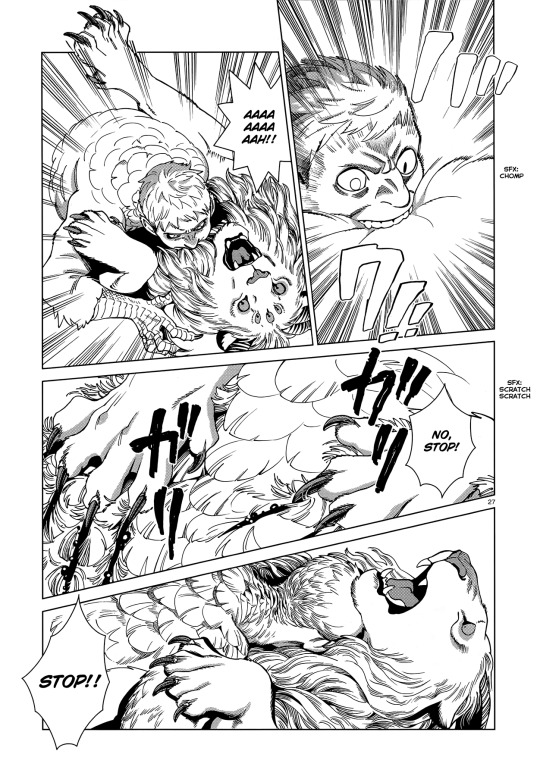
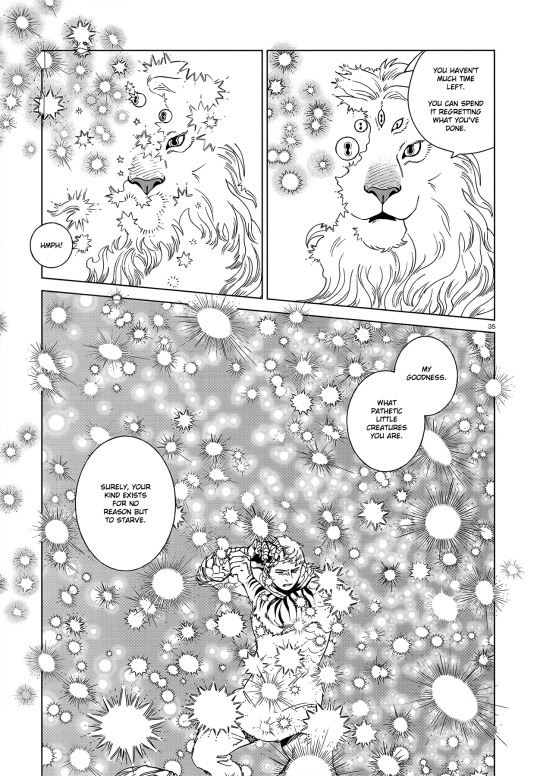
“Surely your kind exists for no reason but to starve” = “you exist for no reason but to die”
as Laios literally consumes life force itself, destroying the demon and destroying its magic. After he does this, the races are portrayed as one unit. The elves say that while magic isn’t gone, the demon’s and what came with it is, and that things will be different from thereon-out.
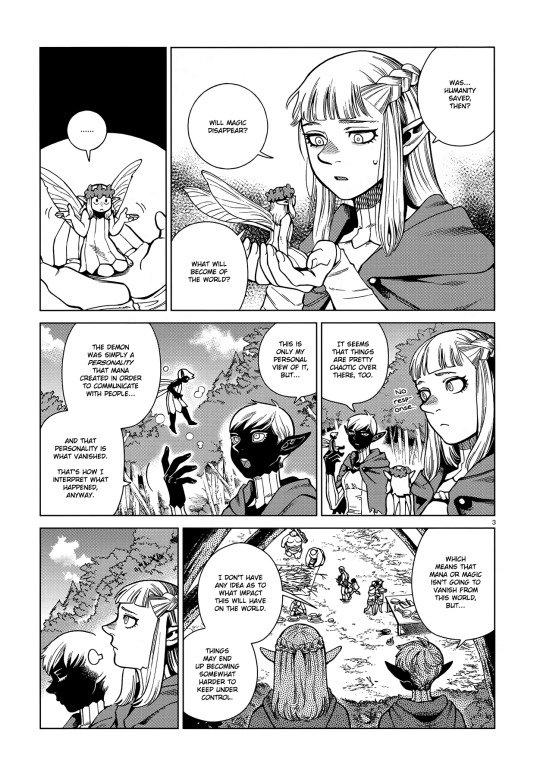
magic will continue to exist, but its been effectively reset, or unraveled, by the death of the demon.
the ability to live hundreds of years is lost, and while the winged lion, an eternal creature, thinks of this as a curse, to humans it’s a secret blessing. The impact of time is what keeps us going.
The structures set up by the ancient lifespan wishes are also undone. No race should get to live longer than any other, humans shouldn’t have unnatural structures like that. It disrupts the natural flow of living. Thats the resolution to the lifespan issue. Not “Marcille has to accept that she’s going to live an unnaturally long life”, but “Marcille has to accept that no one should have that much time, including her”.
That’s why I think the lifespan issue is resolved when the demon dies. Thanks for reading, if you managed to read all of this.

29 notes
·
View notes
Text
the greatest narrative on autism in dungeon meshi is the way the story handles laios' relationships with other people
he's kinda insensitive and gets easily hyperfocused on what interest him, to the point even namari who never thought of him as a bad person didn't have the most stellar impression of him
but as the story progresses, as laios is put in situations that needs him to thoroughly communicate with others, even the reveal of shuro's distaste of him becomes an important part of his character growth
but this isn't a one way street where laios learns to be "palatable" to neurotypicals
this is a story of how people accepts that laios is different, and adjusts their interactions with him to suits his needs, the same way laios who left his village because he was disgusted by how they treated his sister, who ran away from the military due to his refusal to conform to the norm, became a king of a nation where multiple races live not in a total harmony, but in mutual understanding
2K notes
·
View notes
Text
Okay I'm doing it. I'm chapter 96 posting.
This is not meant to be a big analysis post this is mostly just me sharing all the little moments that Marcille & Laios show their care for each other because they are SO beloved to me. Join me on the journey if you wish.
(but also the above statement may be a lie. I do have a point here, it turns out, and the point gets at some of my Big Feelings of what Dungeon Meshi has to say about the nature of friendship & living in the world)
So, first of all, the conversation about Laios being king at the start of the chapter. Just in general Laios insisting on presenting himself in his own way here is so good. Character development!!
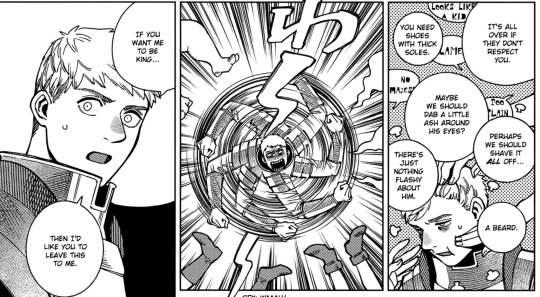
Before the events of the story he hadn't shared his inner world with anyone but Falin. Now he's like Actually I'm gonna dress up in the discarded remains of my monstersona and that's just how it is.
And even though there are a LOT of parts of the story and bits of character growth that go into this, I think it specifically highlights some interactions from a few chapters ago.
After all, his initial reaction to having been in that monster form & coming out of it was trying to hide from everyone.
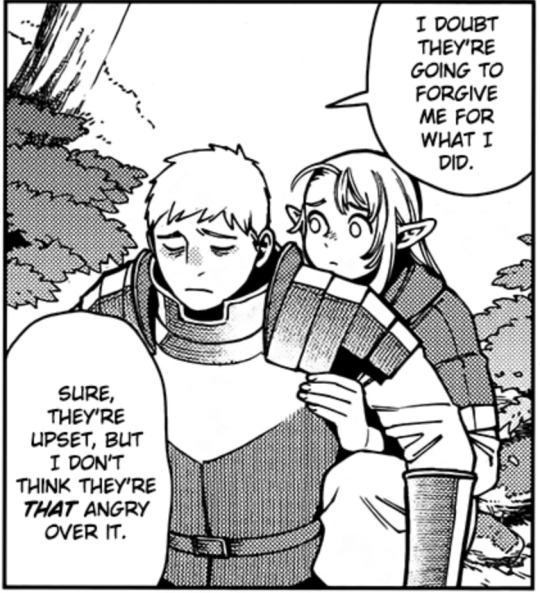
And I think everyone helping him put things in perspective here contributes to how he is able to present himself as king. They assure him that he is accepted, despite having just been seen by EVERYONE at his Peak "Weird Monster Guy" mode.
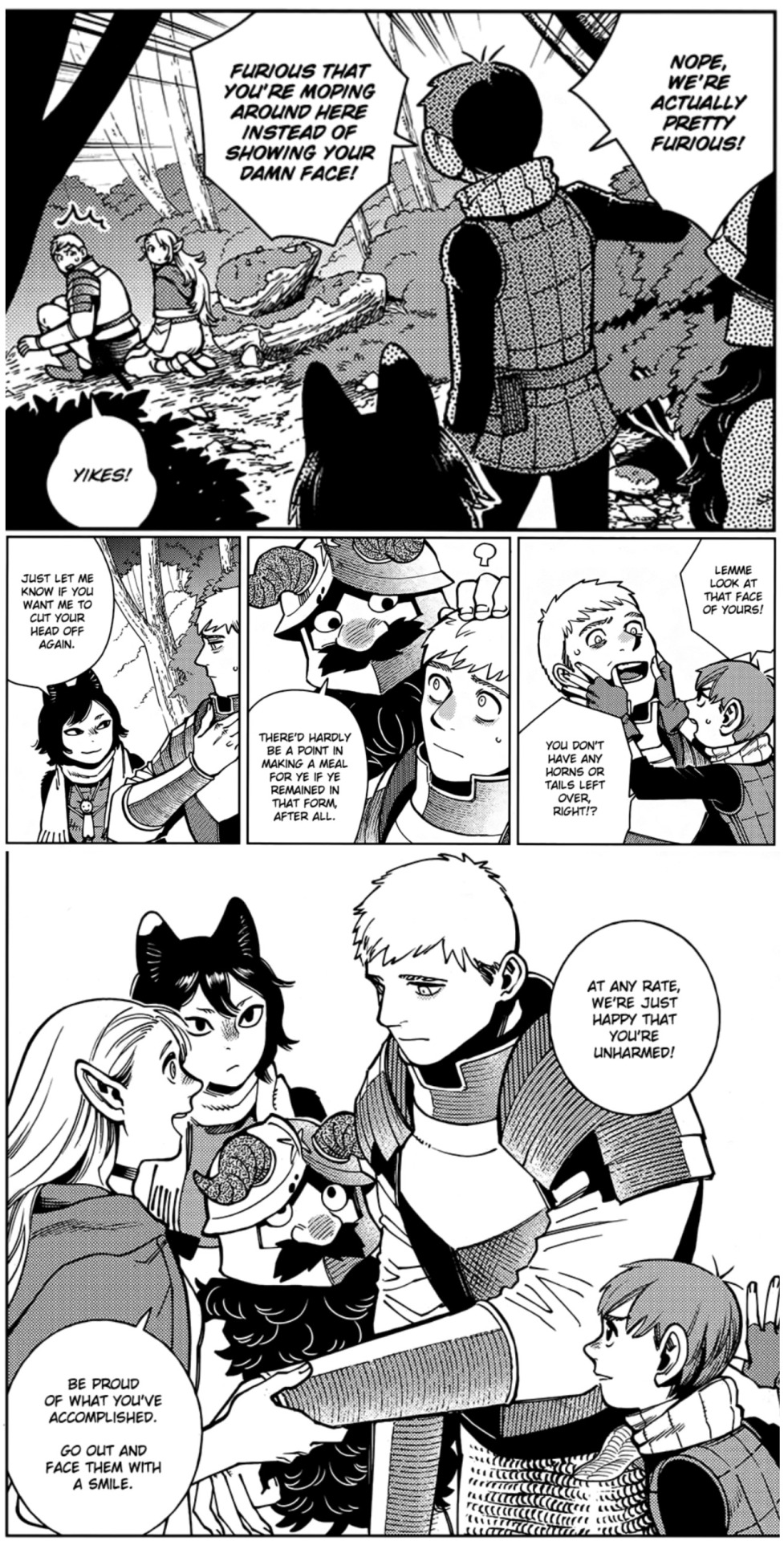
Highlighting what Marcille says here especially:
Going out to "face them with a smile" is EXACTLY what he does. Not right away. He's still pretty stressed in the following scene in this chapter. But he is able to face the crowds with a smile, eventually...
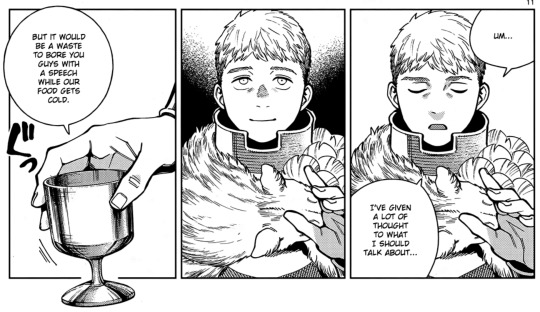
As king. Dressed in the memory of his most vulnerable moments, the most honest expression of his desire.
BUT I'M GETTING A LITTLE AHEAD OF MYSELF. Before the King Laios speech, there's a little moment with Marcille I want to highlight, because...
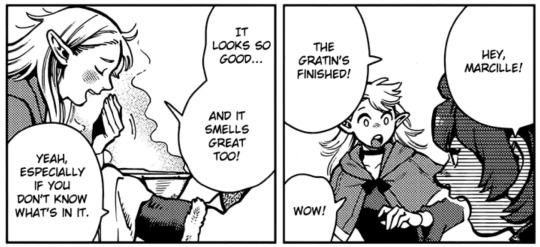
Did y'all know that by the end of the manga, Marcille isn't like... grossed out by eating monsters any more? Or at least, she's definitely changed her reaction to it. It's Namari who makes the "yeah it smells good despite what it is" comment, not Marcille.
We even get shots later of Tansu, Shuro, and Kabru being kinda grossed out by - but still going ahead and eating - the different Falin foods. Chilchuck also throws out a line about it being surprised that it's good.
But there's no disparaging comment from Marcille, despite the Everything of the situation. I just think that's also a nice little detail. She may not be as far in the monster eating game as Laios, but she's more willing to roll with the weirdness.
So after this little moment, this is when Laios comes out in his new regal outfit. And first of all...
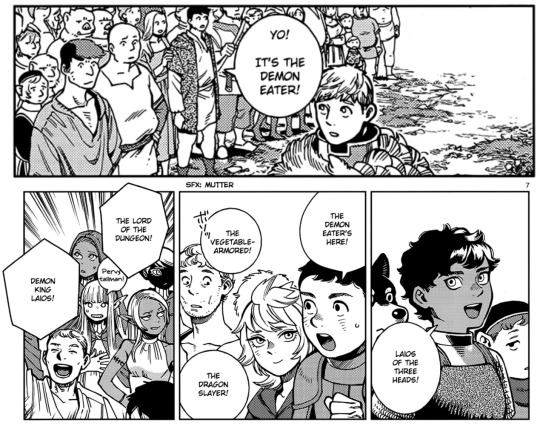
This is such a good contrast to the moment when the group goes to save Marcille in chapter 84. The monsters had stopped attacking, and everyone's reactions to Laios and the others framed him as unsettling. Creepy. Maybe even traitors.
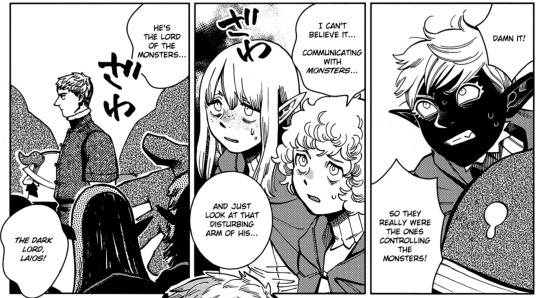
They even use some of the same labels (lord of the monsters/lord of the dungeon, dark lord/demon king)., but the context is that they are disgusted. The parallels in this manga....

Have a tendency to destroy me. What a difference in reception.
Anyway, after this moment, Laios stops to talk to the group... and I'd like to point out again: MARCILLE ISN'T FLIPPANT HERE EITHER!!
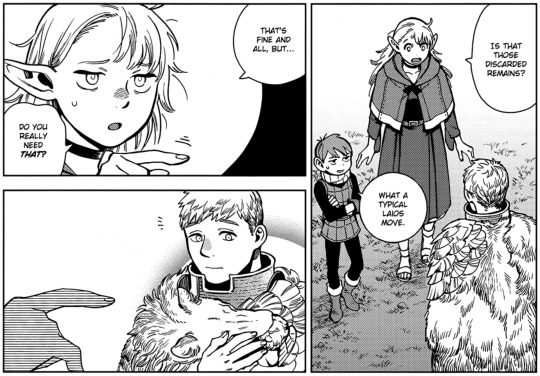
Chilchuck is still Chilchuck, of course, and I want to be clear I love that, too. Chilchuck is who he is to his core. His little jabs are very affectionate in this chapter.
But Marcille... Marcille only points to the Winged Lion symbol as being weird, not the monster bits. And like, considering what she's just been through with the lion, being skeptical of that part is... fair.
(don't get me wrong, her "that's fine and all" isn't exactly excitement. BUT the point I'm trying to make is less about her completely changing her feelings & preferences. It's more about how she expresses them, and how she treats Laios and HIS feelings & preferences)
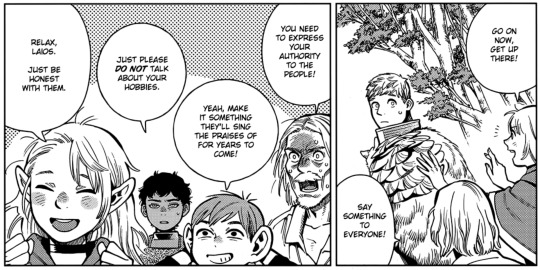
And she continues to be so encouraging!! Wah!! Like, despite, all four of these people definitely caring about Laios, it's Marcille specifically who tells him to relax and just be honest. And you know what? I think that's what Falin would have said, too.
Please also note how cute everyone's little faces are in the crowd:
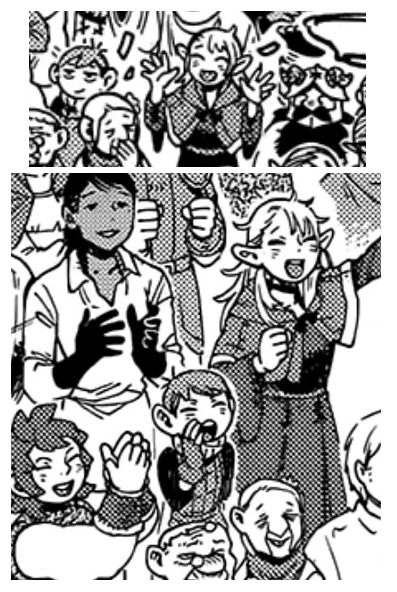
(see, Chilchuck loves him too!! Look at that fond face, and the cheer. and Senshi! and Namari! They really are such a family)
Laios' short speech actually has a little bit I'd like to highlight as well, since I think it is a nice little reflection of his choice to keep the lion insignia on his new outfit:
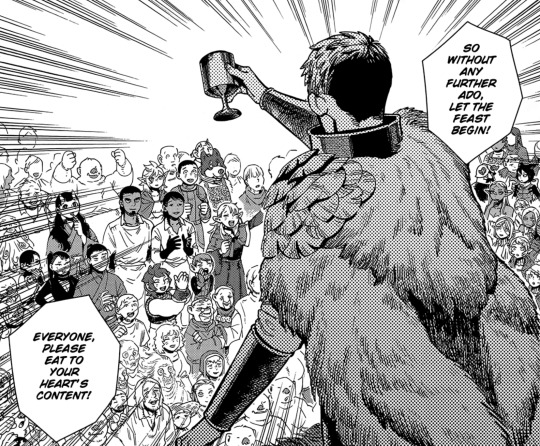
"Eat to your heart's content," he says. Not just "enjoy," or "let's eat."
Dunmeshi does such a wonderful job of framing so much about the Winged Lion with nuance, and this is a good example of that. Desire is not bad! Craving and consuming is beautiful. As Laios says when explaining the lion insignia...
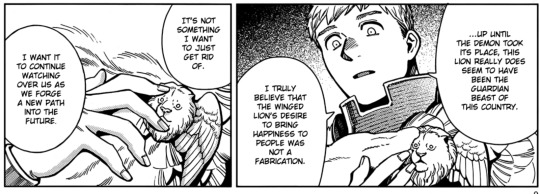
It's not just something to get rid of.
So then... on to the feast!
And not only does Marcille not express any grossed out feelings, as I mentioned before... she even helps to gross out Chilchuck!!
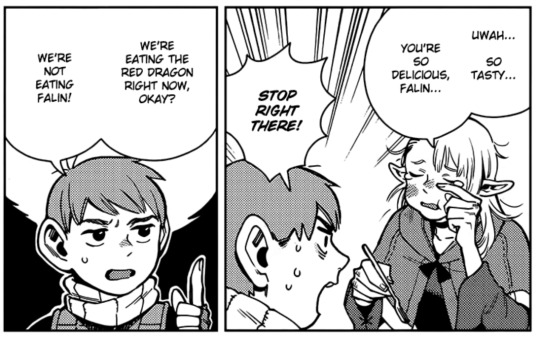
Her weird girl powers are only just in their infancy. She will only grow more powerful in time...
As the feast goes on of course we get the group's realization about her hair, and I'd like to point out:
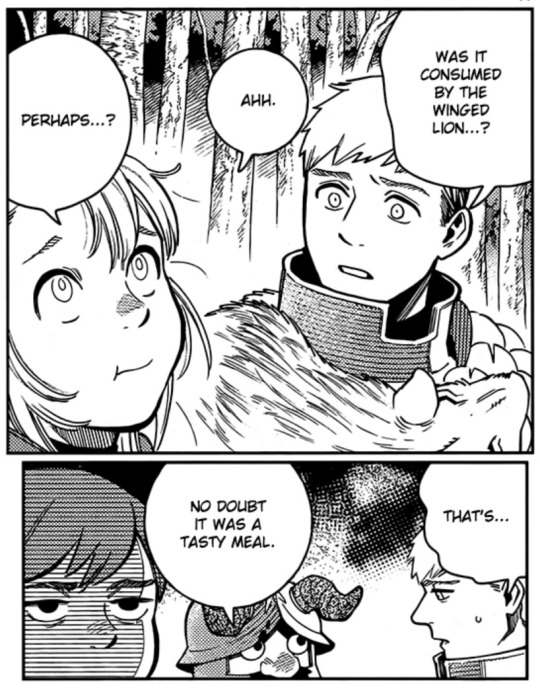
I really feel like they have such similar reactions to finding out about how the other has been affected by the Winged Lion
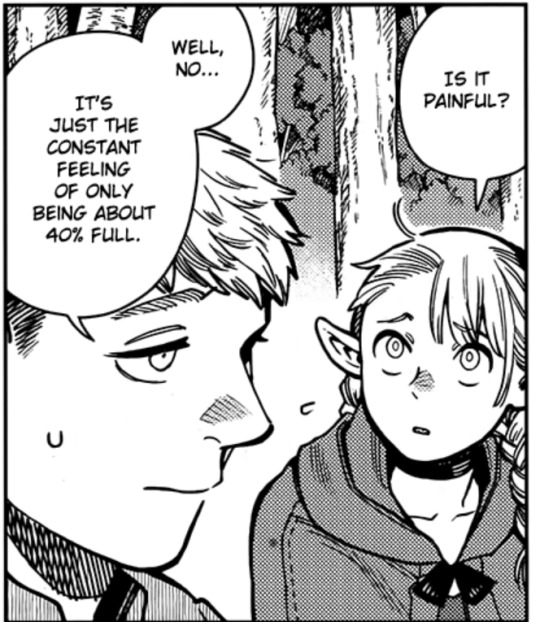
Just... the quiet concern. Not making a huge fuss, but... worried. Understanding. A little heartbroken for each other.
SPEAKING OF HEARTBROKEN REACTIONS THOUGH. WHAT COMES NEXT REALLY GETS ME.
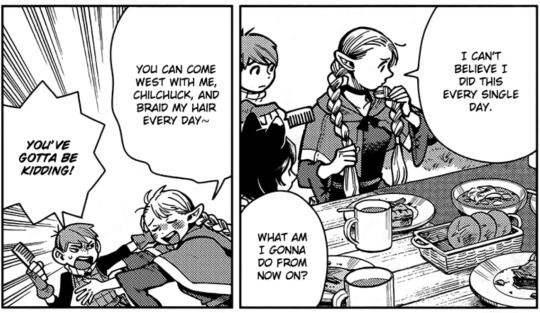
After Chilchuck braids Marcille's hair for her, the topic of her needing to leave everyone comes up and...
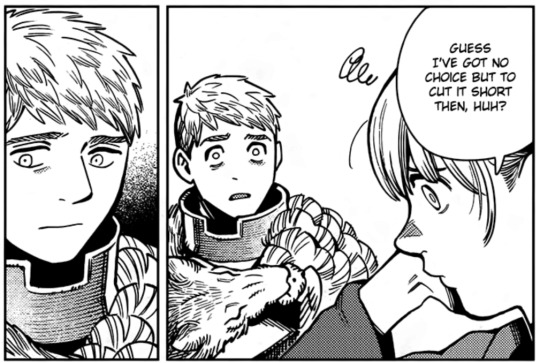
God, these expressions. Every Time I see these panels I think about about what Laios saw in her nightmare. Her fears. The weight of inevitable loneliness, and the way it has marked her. As much as Marcille tries to keep things light when talking about it, he knows what this means to her. And it HURTS.
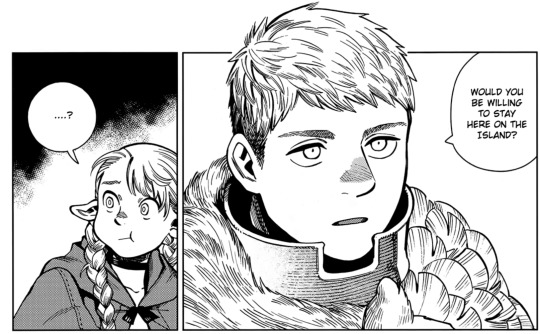
So he doesn't accept it. But do you notice how he frames this. Do you see. Not "do you want me to fix this." Not "hey I have an idea."
"Would you be willing to stay."
He doesn't know whether she will accept. Whether she will hate the idea, actually, of staying here with him. He's putting himself out there fully prepared for rejection & dismissal, as he has faced many times before.
But his pitch, his proposal to her, it's not JUST an excuse to ask her to stay, either. He's put thought into this. Into what Marcille could mean and do here. Not just to and for him, but for the people of this area. The place he has taken responsibility for.
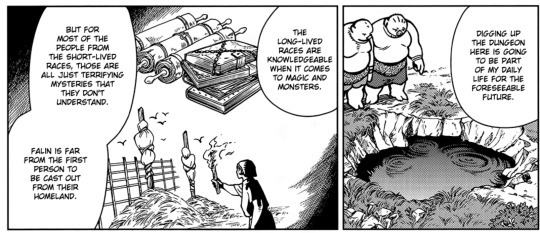
He's also thinking about Falin. And about all the other little girls, the people of all sorts, just like her. He's thinking about the people who have been killed (burned at the stake???), hurt, shunned. About the people who have been abandoned. The people who are still alone.
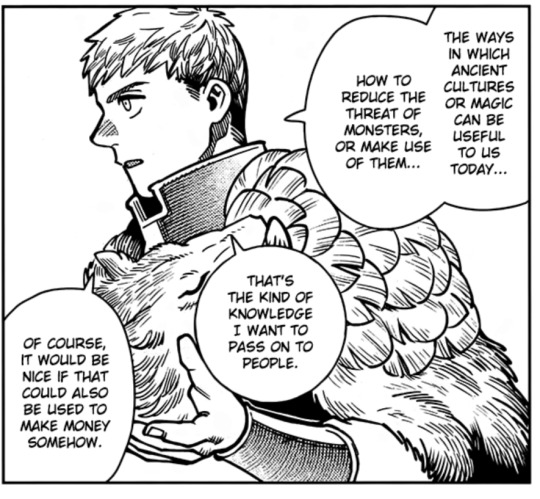
He's not just offering Marcille an out from her isolation, he's offering her a new purpose. A new way to continue her work, to do the things she cares about. He SEES her! he understands her.
BUT ALSO HE'S SO NERVOUS OUGH. FIDDLING WITH THE PLATE. UNSURE IF SHE WILL CARE. UNSURE IF HE HAS IT RIGHT.
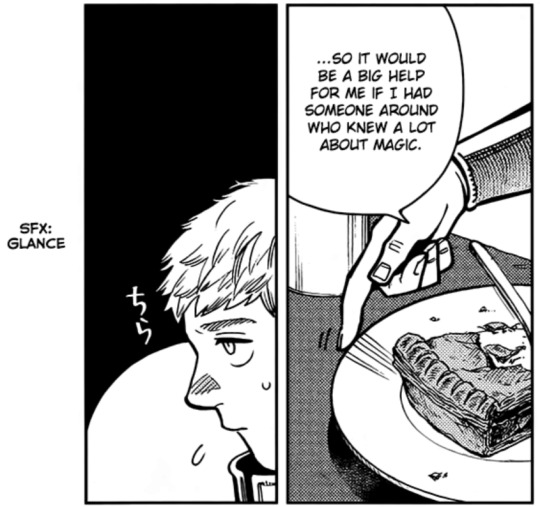
HE'S NOT GOOD WITH PEOPLE HE'S NOT GOOD AT THIS.
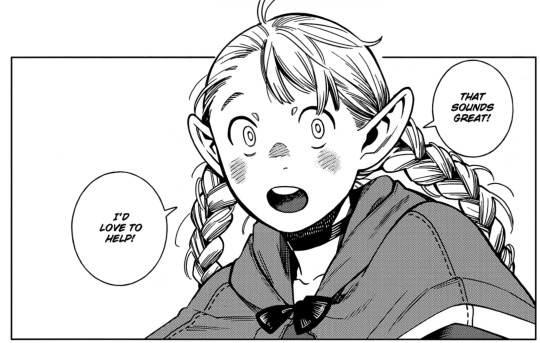
BUT THEY UNDERSTAND EACH OTHER. AND SHE WANTS THIS LIFE HE'S OFFERING HER.
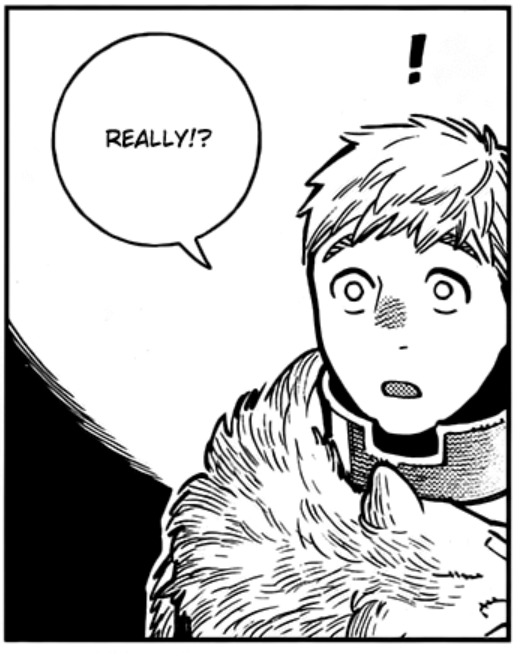
Still... it's not that simple for her, even if for a moment she is swept up in how much she wants this.
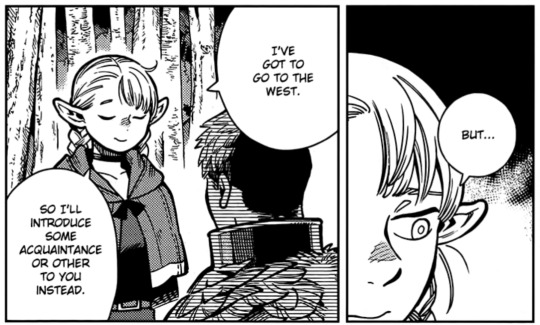
Again here, Marcille is working so hard to be chill about the whole 'going west with the elves' thing. She looks absolutely devastated in the first panel, but puts on a smile in the second.
Maybe she doesn't want to bring down the mood. Maybe she doesn't want to burden everyone with what seems like the only option she has. Maybe she had already accepted the cost that might come with bringing Falin back. Maybe after everything with the Winged Lion, she doesn't want to risk letting herself fight for her desires too hard.
But hey. Desires aren't always bad. They aren't something to just get rid of.
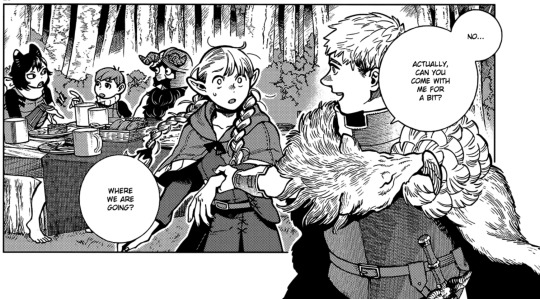
A small bit of visual storytelling here... I love that Marcille is confined by the panel, but Laios is stepping outside of it. He's literally pulling her outside of the box she feels trapped in.
Also, I love that his first acts as king are:
1) welcome everyone to a big feast
2) stand by his friend and help her find happiness
It's great stuff and it's so Laios.
In addition to that, I love how this whole act actually plays out. I love that, while getting the elves to let Marcille go, he gets to be extremely cool and protective...
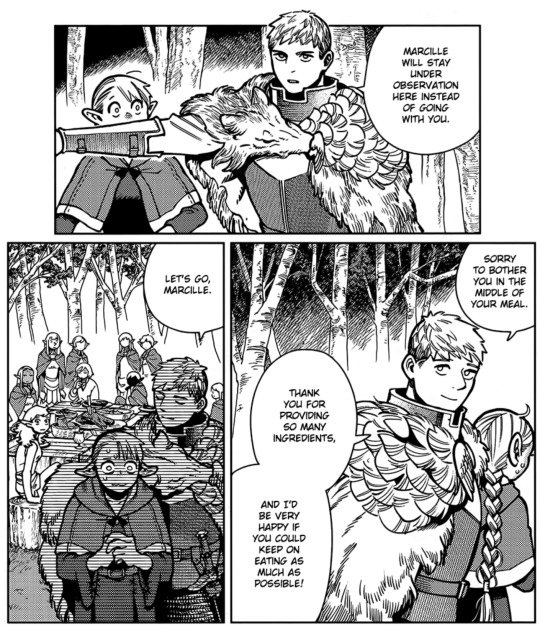
but also like. Not THAT cool and protective.
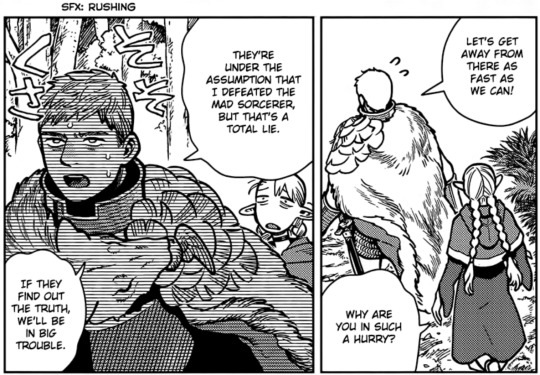
No really, I mean it! I think it's important! It's important that cool 'suave king guy Laios' is a front he puts up when he needs to deal with these strangers, and one that he completely drops once it's just him and Marcille.
He's not trying to impress her, or convince her he's cool and suave. Why would he? He trusts that she's okay with the messy, often unimpressive, sometimes kinda gross reality of who he is.
And isn't that what Dungeon Meshi is all about? Messy, unimpressive, gross reality. And how beautiful, how wonderful, how very precious it is
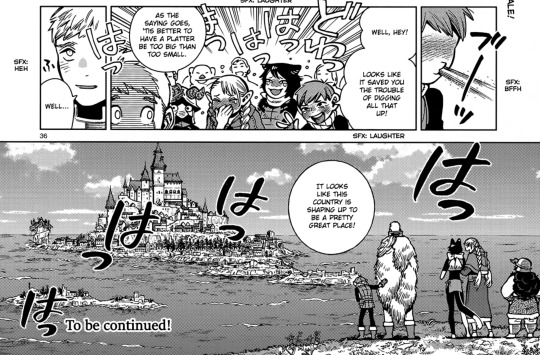
Especially when you get to share it with your friends.
#dungeon meshi#delicious in dungeon#laios touden#marcille donato#dunmeshi analysis#dungeon meshi spoilers#posting on this blog bc I'm not sure the sideblog is showing up in tags yet :/
650 notes
·
View notes
Text
Here’s my impression of Dungeon Meshi ancient history
Dungeons are built around demons in ancient times. The demon hive mind is still suggestible and does not fight being imprisoned until it’s too late, similar to how they accepted blood sacrifices because it was expected of them, despite gaining no nourishment from them. Additional demons are intentionally summoned as more dungeons are built.
I kinda got the impression that multiple species (or their ancestral populations) were a lot closer in power dynamics in ancient times .
But then a mass extinction event happens due someone using the dungeons power or assigned to watch over the demon in the dungeon wishes for the world to end (I think centered around the dungeons and wonder if every dungeon exploded at once )
The ogres never recovered, being a species that evolved/ magically modified themselves around having an abundance of food. Their metabolisms that allowed them to build such powerful muscles were now maladaptive and led to mass starvation. Any transportation devices or monster steeds they had became unusable, rebellious or lost in the calamity , and like in universe scholars note they were too heavy to ride horses. Their settlements became isolated
Some of populations of long lived species were able to rebuild their tech base quicker in at least a few places,
By luck or culture the gnomes never become a major power and alternate between competing with and allying with their sister species, the dwarves.
Dwarves, elves and gnomes find dungeon ruins that still have a glimmer of power, and often have the military power to claim them. Dungeon lords either arise or the settlers make devices to channel power of the dungeon to rebuild the dungeons with magical power (devices such as Thistles book?). Which is why all dungeons being dealt with in modern times have mostly elven or dwarf architecture.
Wars happen devastating much of the Western continent. Dungeons start being suspected of evil power , and it’s decide their safeguards to keep the demons in line are not enough, and dungeons are abandoned
After or in spite of continued wars, elves and dwarves make a pact to monitor to work and keep tabs on dungeons. The gnomes are allowed in, but some gnomes not in high ranking government positions seek to unveil the secrets hidden by the elites concerning ancient magic
The dwarves monarchy lacks much power compared to regional governors , so elves end up doing most of the enforcement of treaties concerning dungeons
20 notes
·
View notes